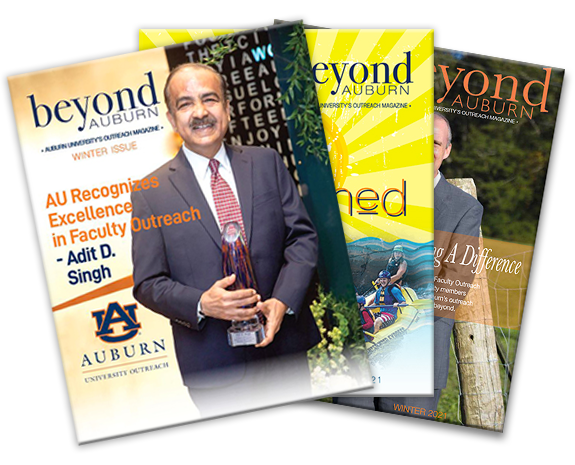Beyond Auburn Magazine
Winter 2024: Faculty Excellence: Adrienne Duke-Marks Recieves Award For Excellence In Faculty Outreach
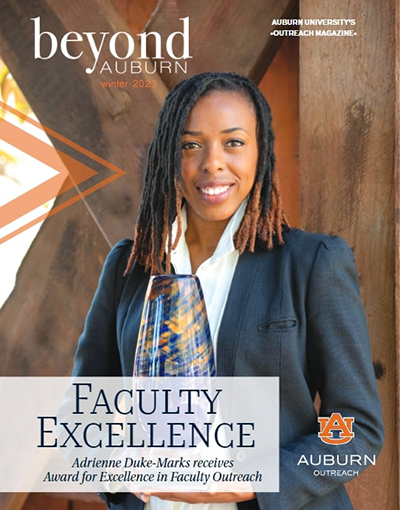
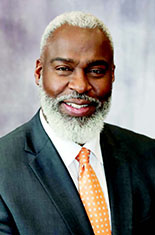
The academic year is proceeding well at Auburn University Outreach with great progress on exciting new initiatives and opportunities to celebrate the impactful engagement of Auburn’s faculty, students and staff.
Kicking off the semester this September, more than 149 faculty, staff, students and 14 community partners attended our annual Outreach and Engaged Scholarship Symposium. This program provides a forum to discuss engaged scholarship and learning, community dialog and partnership, and exemplars of outreach/extension. Entitled “Advancing an Engaged AU” the symposium featured noted engagement scholar, Jennifer Purcell of Kennesaw State University providing the keynote. The symposium showcased more than twenty dynamic Auburn initiatives which are engaging communities in addressing critical needs in our state.
One of the projects featured in the symposium’s roundtable sessions is Auburn University’s Rural Health Initiative (RHI). Jointly led by University Outreach and the Alabama Cooperative Extension System with partnering academic units, including the College of Human Sciences, College of Nursing and Harrison College of Pharmacy, RHI strengthens Auburn’s capacity to address health care access and improve health outcomes among Alabama’s rural and underserved populations. Utilizing the innovative technology of the OnMed® Telehealth Station coupled with hands-on wellness care provided by Auburn faculty and students, RHI is having a significant impact by expanding access to health care in the LaFayette area with the opening of a new Chambers County Community Health and Wellness Center. Along with the continuing support from many state agencies and organizations, the initiative recently received $1.5 million in funding from the State of Alabama to expand this exciting project to four more Alabama county locations.
Other outreach programs are experiencing significant success as well. The College of Education and University Outreach recently received an $18.4 million grant from the U.S. Department of Education’s Office of Postsecondary Education to provide greater access and academic opportunities to more than 6,500 Alabama middle school students. The seven-year grant was awarded for the collaborative Gaining Early Awareness and Readiness for Undergraduate Programs (GEAR UP) Achieve initiative. This record grant will be administered through the College of Education’s Truman Pierce Institute, University Outreach’s Center for Educational Outreach and Engagement, and the Department of Curriculum and Teaching in the College of Education.
Outreach’s Office of Professional and Continuing Education (OPCE) has partnered with the well-known and respected Bonnie Plants company in developing innovative training programs for its Station Sales Managers. The Effective Leadership Program offered by OPCE’s Global Leadership Training division helps Bonnie Plants’ managers develop advanced skills for leading an effective team, conflict management, understanding motivation and managing employee performance. The first class of Bonnie station sales managers completed the week-long course in September.
It is with much pleasure that I would like to recognize three significant awards which have been presented to some of Auburn’s most outstanding outreach initiatives, scholars and professionals. The previously mentioned Rural Health Initiative received the President’s Outstanding Collaborative Units Award for 2023 for its unique engagement of Auburn faculty and staff in remapping Alabama’s health landscape, positioning Auburn as the state leader in rural health care. This prestigious award underscores the importance of this unique collaboration in greatly expanding health and wellness opportunities for rural Alabamians, while also providing authentic clinical experiences for Auburn students.
Among Auburn’s Faculty Excellence Awards, Adrienne Duke-Marks is the recipient of the 2023 Award for Excellence in Faculty Outreach. An associate professor and Extension faculty member in the College of Human Sciences, Duke-Marks is an extraordinary faculty member who inspires students, faculty, and those she touches in the community through her distinguished outreach to the youth and families in Alabama. Duke-Marks facilitates and trains agents, staff and school-based personnel to promote bullying education programs engaging more than 8,000 youth. With the support of regional extension agents, Duke-Marks’ work with the vaping prevention program Escape Vapes has engaged more than 7,000 youth and adult participants. Clearly, Dr. Duke-Marks’ outstanding commitment to outreach is having a remarkable impact on Alabama youth and their families in addressing these critical issues, and I offer my congratulations to her on this great recognition.
Mary Lou Ewald, director of Outreach in the College of Sciences and Mathematics, has received the inaugural Royrickers Cook Endowed Engagement Award. I am deeply honored to have this endowed award program created in my name last year through the generous support of my family, colleagues and friends, to whom I am sincerely grateful. But I am especially gratified that this first namesake award recognizes Mary Lou Ewald, an accomplished professional and long-time supporter of Outreach. Director Ewald has devoted her exemplary career at Auburn to community engagement, specifically expanding STEM educational opportunities for K-12 students across Alabama. Thousands of students have participated in summer science camps, robotics programs, and Science Olympiads developed and managed by Mary Lou Ewald. Her influence as a STEM education professional extends well beyond campus as evidenced by her appointment by Governor Kay Ivey to Alabama’s STEM Council.
It is a privilege to use these venues of symposia, awards, and publications such as Beyond Auburn to recognize and promote the hard work and faithful engagement of Auburn’s engaged scholars and professionals. It is important to reflect and celebrate the impact of our collaborative outreach. Clearly working together through engagement makes a difference in so many lives across our state.
As we always say, join us in making a difference.
War Eagle!
Royrickers Cook, Ph.D.
Vice President for University Outreach and Associate Provost




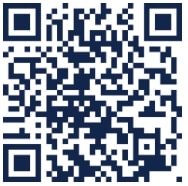
Outreach at Auburn University is an essential component in its three-prong mission of instruction, research and outreach.
Support outreach today!
auburn.edu/outreach/makesadifference.htm
ACADEMICS. RESEARCH. OUTREACH
Campus and community friends are invited to use these interactive platforms to share their opportunities, projects and programs.
AuburnServes
The AuburnServes network functions as a repository for community partners to chronicle needs and offer volunteer opportunities to students

Outreach Programs and Projects Network
Through this database, Auburn University faculty can share information about their Outreach programs and projects to facilitate further engagement, promotion and partnerships.

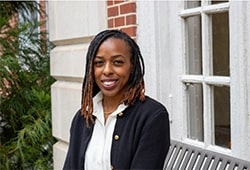
2023 Award for Excellence in Faculty Outreach
What makes two similar-aged children from similar backgrounds sometimes take widely divergent paths in life? Can programs make a difference in the lives of all youth, regardless of background? Adrienne Duke-Marks — recipient of the 2023 Award for Excellence in Faculty Outreach and associate professor and Extension specialist in the College of Human Sciences — is on a mission to address risky behavior that starts in adolescence by ensuring programming positively impacts youth, their family, school and social environments. She tackles it from a unique angle.
“Researchers tend to study problems, but I study the solutions,” Duke-Marks said. “I want to know what can be shifted to positively impact the lives of youth and change their knowledge, behavior and attitudes.”
Context clues in human sciences
Duke-Marks pivoted into human sciences following an undergraduate degree in English and a master’s degree in Pan-African studies. During her master’s, she worked as a program coordinator for a youth development program and an observation piqued her interest.
“I worked with children from the same school and same after-school programs and the differences across their families — how they disciplined, what they accepted, what they did,” she said. “It made me curious to pursue a graduate degree where I could study adolescents in the contexts of their development — family, community, noticed extracurricular activities, school. That’s how I got to human development and family sciences.”
Within her studies, she learned about positive youth development (PYD). The theoretical framework suggests that when youth are in contexts that highlight, capitalize, build and cultivate their strengths, then they are in a condition to thrive and turn away from risk behaviors.
“In an environment where they are engaging with prosocial activities and adults that care about them, kids are less tempted to engage in risk behaviors,” Duke-Marks said.
PYD is grounded in the 5Cs that promote well-being in young adults: confidence, competence, caring, character and connection. Adolescents (ages 9 to 19) thrive when the 5Cs are reinforced in multiple contexts. For example, they might receive those at home and through a sports team, debate team or from friend groups and mentors.
“Youth programming is designed to create spaces that foster and reinforce those conditions of youth well-being,” Duke-Marks said. “The programming that I create uses this theoretical framework to help build connection, care, empathy and other character traits that ultimately give adolescents the confidence to say no when confronted with the opportunity to engage in risky behavior.”
Tackling Bullying
Specifically, Duke-Marks adapted the award-winning
Be SAFE anti-bullying program and brought it to
Alabama. Her adaptation included publications and
resources for community audiences and the five-part
series Advancing Bullying Awareness administered
through the Alabama Cooperative Extension System.
“I developed resources for parents so they could support their children whether their kid is the bully or if their kid is the victim of bullying,” she said. “We also adapted the program to questions the Extension programming staff received in the communities.”
At the helm of Be SAFE for five years, Duke-Marks facilitated and trained agents, staff, and school-based personnel to promote bullying education programs affecting more than 8,000 youth since 2018. She consistently found that youth significantly increased their knowledge of how to help someone bullied.

“To end bullying, someone in the social context of where it’s happening has to stop it,” she said. “Our program helped kids become defenders and allies.
Escape Vapes
In addition, Duke-Marks has worked to develop a suite
of anti-vaping programs with Alabama Extension
called Escape Vapes. The focus is debunking the
perception that vaping is less harmful than traditional
cigarettes.
“Vaping is a technology, it’s not just a substance,” Duke-Marks said. “Things change rapidly with these types of devices: the way in which people can vape nicotine and THC, the availability of it. And so, the research is really slow to catch up just because it’s rapidly changing.”
Duke-Marks has adapted the program to address the links between vaping and mental health and the serious lung problems now known to be caused by vaping THC.
“It’s been a constant adaptation the last five years that we’ve been working on Escape Vapes,” she said. “I’m leading, monitoring and evaluating the program because we constantly want to improve it. ”
To date, Escape Vapes has helped more than 7,000 youth and adult participants across Alabama. Duke-Marks has helped youth and their families address this critical issue through systematic outreach efforts that resulted in school and community programs, educational publications, blog posts, public forums, and news. Since the program’s implementation, 46% of youth have had a greater understanding that one pod or disposable vape pen has as much nicotine as one pack of cigarettes. The program reported that participants experienced a 30% increase in confidence levels in avoiding nicotine products.
A more robust vaping parent program is on the horizon. Duke-Marks is committed to helping parents understand why adolescents are vaping.
“Parents and schools see it as a disciplinary problem, but vaping is an addiction problem,” she said. “Kids who continue to vape are usually struggling with addiction. The goal for this new program is to bring awareness to mental health issues that often coincide with vaping for teenagers, what to look out for, what to notice.”
What's Next
As Duke-Marks continues her research and grant writing to help fund and improve her anti-bullying and anti-vaping programming, she looks to her students and Auburn community to help combat other critical issues facing Alabama youth.
“As you are living your life and experiencing the world, pause and look around you. There are problems and solutions everywhere,” she said. “Decide where you want to make your impact in the world.”
Adrienne Duke-Marks and other faculty recipients were formally honored at the 17th annual Faculty Awards ceremony on Thursday, Nov. 9. The Award for Excellence in Faculty Outreach, presented by the Office of the Provost at the annual Faculty Awards Ceremony, honors the engagement of exemplary faculty members and demonstrates the tremendous impact Outreach has on our community, state, nation and beyond.
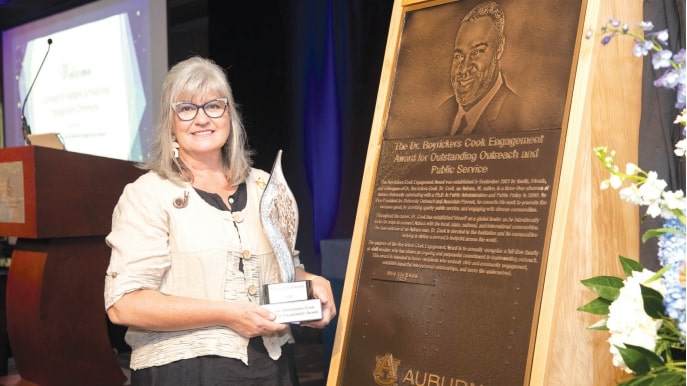
Mary Lou Ewald, director of the Office of Outreach in the College of Sciences and Mathematics (COSAM), is the recipient of Auburn University’s first Dr. Royrickers Cook Endowed Engagement Award.
“Just do one good thing. Just do one good thing every day and you can make a difference,” said Ewald. And she has been making an immeasurable difference for K-12 students for 25 years
“Mary Lou’s dedication and passion for outreach shows that Mary Lou has an exceptional track record of service to Auburn and our surrounding communities.”, said Edward Thomas Jr., dean of COSAM. “Her passion to help students from all areas of the state of Alabama has transformed our college-level outreach efforts into a program that has a regional and national impact while providing opportunities for students to pursue bold and exciting careers in STEM fields.
That difference is not only felt in the local Auburn/ Opelika community but throughout the state and even around the entire nation.
“I remember my first opportunity working for Science in Motion,” said Ewald. “Students would be so excited to be able to participate in hands-on science experiments, and you could see their excitement when I arrived.”
Ewald’s passion to increase the new generation of STEM leaders has sparked students in emerging technologies.
“Outreach helps students develop a lifelong love for STEM that these young learners may not have easy access to in their own classrooms,” added Ewald. “The programs provide an opportunity for them to learn how to code and design robots, use 3D printers, fly drones, and many more skills that they will use in their education and careers.”
During her time as director, Ewald has created numerous programs in the STEM Outreach Center including the Alabama Science and Engineering Fair, Auburn Mathematical Puzzle Challenge (AMP’d), Destination STEM, EmpowHER Conference, Greater East Alabama Regional Science and Engineering Fair (GEARSEF), Getting Under the Surface (GUTS), Mathematical Puzzle Program (MaPP), Science Matters, State Science Olympiads, Summer Science Institute and more.
Auburn University has inspired thousands of students to participate in robotics teams throughout the state and has hosted the BEST Robotics competition for two decades. The team also offers professional development training for teachers throughout the year. Ewald was selected to be a member of the new state’s STEM Council in 2020.
“Twenty-five years of STEM outreach at Auburn University has meant so much to me because I had so many opportunities — not only to make great relationships with partners with people around the state and around the country but opportunities to introduce young students to something that might become their passion one day. I have seen so many students flourish in finding their bliss, finding their passion. And, that’s what it is all about,” she explained.
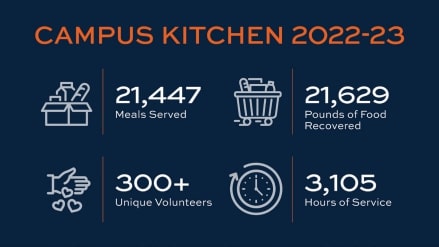
It is a Monday afternoon and student volunteers gather in Lupton Hall for their shift. As they arrive, a shift leader puts them to work assembling meals and preparing pans of food for service. Soon, they will deliver meals to Auburn community members and in Lee County. This is the Campus Kitchen at Auburn at work.
Campus Kitchen is a volunteer force of more than 300 students working to combat food insecurity, defined by the USDA as a “lack of consistent access to enough food for every person in a household to live an active, healthy life.” Formed in 2011, this student-led non-profit organization recovers excess food from on-campus dining halls and repackages it into nutritious meals. Students work in shifts to plan menus, pick up the food from the dining halls, and deliver meals on campus and off.
Auburn Family Meal
“We usually pick up about 1,000 pounds of food a
week and deliver about 800 to 900
meals a week,” said Elise Fitzgerald,
president of the Campus Kitchen
at Auburn. A lot of those meals are
delivered on campus. “Auburn Family
Meal is where students and faculty
at Auburn University can come sit
down or grab take-home meals, no
questions asked.”
Campus Kitchen hosts Auburn Family Meal Monday, Wednesday, and Friday from 5:30- 6:30 p.m. in Lupton Hall. In addition, students may visit the Campus Food Pantry, open Monday through Friday, to stock up on nonperishable items.
A biomedical sciences major on a pre-med track, Fitzgerald is passionate about the connection between food and health.
“The correlation between having access to healthy food and health care is essential,” she said. “Being malnourished can really affect a lot of different health problems, in college, and especially down the road when you get older.”
Approximately 30 percent of college students at American schools are food insecure – and Auburn is no exception. Research shows that lack of access to healthy food can lead to depression and anxiety, malnutrition, poor academic performance, and higher dropout rates. Campus Kitchen, the Office of University Outreach and Campus Dining work in tandem to increase access to nutritious food.
“We were able to renovate the spaces where the Campus Kitchen and the Campus Food Pantry are located with a grant that we received from our partner Aramark. We have specific language in our contract with Aramark that requires that unserved food be donated to Campus Kitchen,” said Glenn Loughridge, director of campus dining and concessions.
“Sometimes food insecurity can be hard to spot at Auburn, but it’s there. It’s part of our mission to make sure everybody gets fed every day. Our partnership with Campus Kitchen is really important in making that happen."
Feeding the Community
Campus Kitchen also delivers meals off campus to
the Auburn and Lee County communities. It partners
with the Food Bank of East Alabama, Meals on Wheels
and area churches to deliver to food insecure. Feeding
America estimates that 1 in 7 people in Alabama are facing hunger, some 746,550 people.
“In community deliveries, we see the impact Campus Kitchen has. With Meals on Wheels, we go door-to-door to deliver meals,” Fitzgerald said. “Typically, they’re elderly residents that are disabled and don’t really have transportation or a way to get meals from the grocery store. I’ll never forget, I handed six meals to this older male, and he just gave me a hug and he was like, ‘This is such a blessing. These meals mean so much to me.’
Mobile Food Pantry
This year, Campus Kitchen is working on a new project
to expand access to nonperishable food by piloting a
Free Little Pantry on campus. They are working with
Eagle Scout Ethan McCulloch to build the prototype.
“I learned about food insecurity in our community through the Scouting For Food program,” McCulloch said. “I didn’t know that the same problem existed in the college population until I learned about Campus Kitchen from a family friend. I hope that this food pantry will expand food availability to those in need on campus and in our community.”
Inspired by the design of the little free libraries, the small pantry will have shelves stocked with nonperishable items supplied by the Campus Kitchen partnership with the Food Bank of East Alabama.
The idea is that eventually community members will help to stock the pantry with donations and keep the community fed on a consistent basis.
“We plan on planting little food pantries around the community that are for anyone who needs food,” FItzgerald said. “We’re working with Ethan to build the first food pantry. It will give us an idea of how much it costs, and we’ll be able to see how it works in the community. Our hope is that by (the spring semester we will) have a goal in mind so that we can say how much money we want to raise to get the program off the ground.”
Their current plan is to build five of the mobile food pantries and test how they work.
“As with any new project, we want to make sure that we are able to manage the supply and demand for the food pantries,” Fitzgerald said. “We need to gauge where is the most need and how often will we have to refill the pantries. If it is successful, we will assess where we will add more pantries. Currently, we are laying the foundation for the project and in the meantime, we will continue to provide meals to the community. At first, a greater part of the financing will come from Campus Kitchen, but our hope is for the community to contribute as well. With faith, we hope to have a lasting impact on in the community.”
Winner of the 2023 Fred and Charlene Kam “Human Touch” Service Award, Campus Kitchen is always looking for volunteers, community partners and those who are combating hunger. Visit their website to learn how you can help in the fight against hunger.

In a significant move that reflects a commitment to nurturing future leaders, Bonnie Plants, the largest grower of vegetable and herb plants for home gardens in the United States, has partnered with Auburn University’s Office of Professional and Continuing Education (OPCE) to launch the Bonnie Leadership Program. This innovative program is set to empower Bonnie’s current and future leaders to enhance their capabilities in leadership, continuous improvement and financial management.
In 2021, Dr. Daniel Yu, assistant director for leadership training in OPCE, and his team, initiated a custom supervisory leadership training program at Bonnie’s Union Spring’s station, where the company was headquartered since it’s founding in 1918. In 2022, Bonnie Plants relocated its headquarters to Opelika to strengthen its partnership with Auburn University, bringing new jobs and recruitment opportunities to the Auburn-Opelika community.
That same year, OPCE partnered with Bonnie Plants to lead two additional programs for its supervisors and station sales managers.
“We’re excited about the opportunities for future growth our new headquarters will provide as we form long-lasting community partnerships in Opelika,” said Bonnie Plants president and CEO Mike Sutterer.
The Bonnie Leadership Program exemplifies such partnerships. Spearheaded by Sutterer, the tailor-made program is designed for high-potential leaders and is a collaborative effort among Auburn University’s Office of Professional and Continuing Education, Bonnie Champions, and several independent consultants. Twenty-six participants are expected to complete the program, receiving individual coaching and mentorship under the guidance of a sponsor
OPCE will conduct eight, four-hour certificate sessions customized to meet the specific needs of Bonnie Plants’ leadership team. Together, OPCE and Bonnie Plants will cultivate the next generation of company leaders by enhancing participants’ understanding of leadership responsibilities and addressing unique leadership challenges.
The training series kicked off in August with a special introduction by Auburn University President Christopher Roberts.
As Bonnie Plants’ new headquarters takes root in Opelika, the collaboration with Auburn University’s OPCE and the launch of the Bonnie Leadership Program are clear indicators of the company’s commitment to cultivating a bright future for the Auburn-Opelika community.
Bonnie Plants’ partnership with Auburn University stands as a testament to their shared vision of growth, opportunity and leadership development. Together, they are sowing the seeds of success for the future, ensuring a vibrant and prosperous community for generations to come.
For more information about OPCE and customized leadership training, visit auburn.edu/opce.
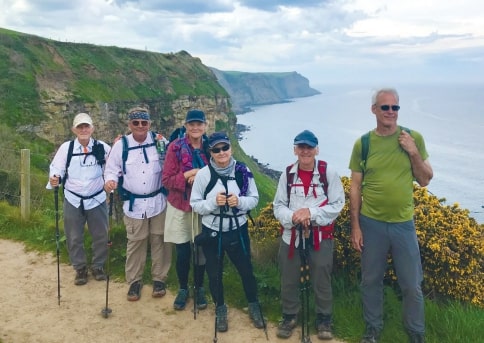
Osher Life-Long Learning Institute (OLLI) at Auburn University seeks to enrich the lives of senior adults by providing opportunities for firsthand learning experiences and social interaction both in and outside the classroom. This spring, a group of OLLI members extended their learning well beyond the classroom by hiking England’s Wainwright’s Coast-to-Coast Trail — a 190-mile trek from the Irish Sea at Saint Bee’s to the North Sea shoreline at Robin Hood’s Bay.
OLLI’s community of hikers began in 2018 when Harold Bruner decided to contribute to OLLI’s mission by facilitating a hiking course. As a retired forester, Bruner is enthusiastic about nature and outdoor activities. Bruner began by offering 4- to 8-mile hikes in state parks and hiking trails near Auburn. Maureen Donnan joined him as the sweep, always making sure that no one was left behind. The course proved to be a success. Harold began offering two hiking courses of differing lengths and pacing each term to accommodate those with different abilities and interests.
Hiking has become immensely popular and provides members with an opportunity to connect with each other while exercising and becoming immersed in the wonderfully diverse flora and fauna of Alabama and Georgia. Class members occasionally take group hiking trips lasting a few days to various state parks. Cathy Love, an adventurous member of the longer hiking course, began to investigate the possibility of taking a group trip to hike the Coast-to-Coast Trail. Six OLLI hikers accepted the challenge.
In 1973, Alfred Wainwright established the path of the Coast-to-Coast Trail in his book, “A Coast-to-Coast Walk.” Walking through the countryside for pleasure has been a popular pastime in England since the 18th century. Anyone who has traveled through England will be familiar with the public gates and stiles that dot the countryside, providing right-of-way access across farmland and wilderness areas. The National Parks and Access to the Countryside Act, which allowed the public to pass through specific paths on private land established this privilege in Britain in 1949. Wainwright stitched together established paths to create a single coast-to-coast path, which became a national trail in August of 2022.
The path would not be easy. The OLLI hikers decided to take 16 full hiking days and one rest day to finish the path. An average day would include about 12 miles of hiking and an elevation gain of around 1800 feet. The longest day’s hike was over 17 miles, and the highest one-day elevation gain was 3700 feet. They studied online resources and engaged a tour company to take their luggage from inn to inn so they would not have to carry everything with them. The tour company provided an online app to help them navigate the trickier trail sections and find their lodgings.
The journey began at the trailhead at Saint Bees where the hikers performed the traditional ritual of selecting a pebble to carry along the path and dipping their toes or shoes into the Irish Sea. Then they set off along the seaside cliff tops. At dinner on the first night, the group talked about how they would measure success. They decided that if there were no injuries and everyone remained friends, they would consider the trip successful.
Each morning the hikers ate a hearty breakfast provided by the inn where they stayed. The full English breakfast of eggs, English bacon, sausage, toast, baked tomatoes, mushrooms, baked beans, and sometimes blood pudding was usually on the menu. Sometimes “walker’s porridge” was also on the menu — oatmeal accompanied by a warming shot of Drambuie.
Along the path, the OLLI hikers crossed verdant hills, heather moors, rolling streams, and steep, rocky crags. They made their way through dense vegetation and passed incredibly lush valley vistas of green and gold. They saw ancient stone circles and Bronze Age burial grounds. They slogged through slimy mud mixed with manure. Some mountainous sections were so steep that they had to grasp onto the roots of heather above them to get purchase for the climb. Some sections of the trail offered more than one option, and occasionally the hikers would split up to take the routes that best suited them.
One of the most difficult sections of the trail was the Nine Standards Rigg walk which consists of nine 800-year-old intricate stone cairns that stand between 6 and 12 feet tall and are thought to have once signaled a formidable border marking. A 40-knot-per-hour wind and an elevated temperature of 40 degrees Fahrenheit accompanied the 1,640-foot approach to the summit. Unfortunately, when the hikers reached the Nine Standards, they were not able to explore them because of the intense winds. They made their way down and found themselves mired in frigid bogs as the day’s hike progressed.
The trail was never crowded, and the other hikers they met were friendly and helpful. Along the way, they hiked through barnyards, carefully opening and closing gates to keep farm animals from escaping. A few times they hiked — at an escalated pace — through pastures in which bulls resided. Some days they hiked all day never passing a pub or store and were glad to find “honesty boxes” left by fundraising kids or church groups filled with canned drinks, water, chips, assorted snacks and even homemade cake. The group made their way through thorny gorse and stinging nettles and vast fields of yellow waist-high rapeseed flowers grown for their canola oil. Though gorgeous to look at, these were not easy fields to walk through. They passed a surprising variety of sheep breeds and were serenaded by the endearing sounds of ewes and their adorable lambs calling each other.
A highlight at the end of each tough day of hiking was meeting in the local pub for a pint of ale to unwind and chat. In the pubs, they met other hikers as well as locals and the dogs who inevitably accompanied them
On the 17th day, the group reached the end of the Coast-to-Coast Trail. Completing the Wainwright Path tradition, they dipped their shoes into the North Sea and flung the pebbles they had carried from the Irish Sea into the waves. They completed a challenge that even young hikers find daunting. Thanks to their careful training and preparations, no one suffered any injuries. Perhaps best of all, they took with them memories of the many experiences they shared with their OLLI hiking friends.
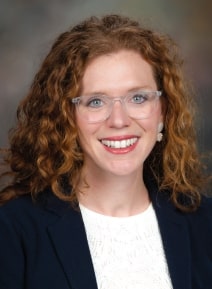
Recently named director of the Center for Educational Outreach and Engagement (CEOE), Anna-Margaret Goldman brings a varied educational and professional background to Auburn University Outreach.
Goldman graduated from Miami University of Ohio with a degree in organizational communication and later earned her master’s and doctoral degrees in Higher education administration from the University of Alabama. While studying at the University of Alabama, she worked with the Center for Service and Leadership to help run a school-based mentoring program in Tuscaloosa city and county schools.
After leaving Tuscaloosa, Goldman worked as an AmeriCorps VISTA and youth development coordinator for the Flagship Program, an afterschool program in Missoula, Montana. While in Montana, she also led MonTECH, Montana’s assistive technology program, and served as a professor of practice in the Department of Public Administration and Policy at the University of Montana.
Anna-Margaret Goldman is also known for her work as the director of TRIO Upward Bound at the University of Montana, where she helped low-income and first-generation high school students attend college. She was the principal investigator of a $2 million grant from the Department of Education and wrote and managed ESSER Summer Enrichment, Afterschool Grant, and Summer Food Service Program from the Montana Office of Public Instruction.
Goldman sees numerous challenges facing K-12 education in the state and was drawn to the Auburn community and the land grant institution where outreach is part of the mission. Goldman’s passion for improving K-12 education for underserved students led her to Auburn University and the Center for Educational Outreach and Engagement (CEOE).
“The organization’s goal of using the power and resources of the university to improve K-12 education, particularly for underserved students in my home state of Alabama, made me apply for the position, “ said Goldman. “Coming back to Alabama and having the opportunity to work towards changing K-12 education and addressing and being a part of changing some of the systemic inequities was very appealing to me."
Goldman and her staff are working toward a mission of transforming local underserved K-12 communities through programs and partnerships in the classroom and beyond. CEOE defines underserved as K-12 students and communities who are: first-generation or neither parent has graduated from college, eligible for free and reduced lunch, students of color, English-language learning, and students with disabilities. CEOE prioritizes working with K-12 students in the Auburn area. To meet this process objective, they strive to serve students in region 9 – Tallapoosa, Elmore, Macon, Lee, Bullock, Barbour, Russell and Chambers counties.
CEOE provides academic support, opportunities, and college and career exposure for underserved students through several primary programs. Young Professionals in Training is a mentoring and tutoring program led by college mentors for Lee County students in 5th-12th grades that provides social, career and academic skills. Workforce Innovation Opportunities Act (WIOA) Supplemental Program contract provides intensive skill-building workshops and campus visits for students in Bullock and Macon County schools. Outreach Ambassadors lead college and career exploratory visits to middle and high school students. Lee County Career and Technical Academy is a college and career skill-building series with workshops to build global communication, entrepreneurial, financial literacy, social-emotional, and employability skills. Service in Schools is a one-credit hour class taught in partnership with the Honors College where Auburn University students have the in-class learning and the experiential experience helping with needs in the K-12 setting.
Although there is a considerable amount of work being done. For Goldman, the work of addressing some of society’s most pressing needs is rewarding.
“It’s an honor to do this work,” said Goldman. “Not many people can go to work doing the work they are most passionate about and addressing some of the greatest needs as part of their job. It feels like a privilege and an honor
For more information about CEOE programs visit www.auburn.edu/outreach/ceoe/.
“Not many people can go to work doing the work
they are most passionate about and addressing
some of the greatest needs as part of their job.
It feels like a privilege and an honor.”- Anna-Margaret Goldman, Ph.D.
Director, Center for Educational Outreach and Engagement

Led by efforts from the College of Education and University Outreach, Auburn University has received an $18.4 million grant from the U.S. Department of Education’s Office of Postsecondary Education to provide greater access and opportunities to more than 6,500 Alabama middle school students.
The seven-year grant was awarded to Auburn’s GAINING EARLY AWARENESS AND READINESS FOR UNDERGRADUATE PROGRAMS (GEAR UP) Achieve initiative and is partially funded by the U.S. Department of Education. The program features $2,630,266 in first-year funding and an expected total funding of $18,411,586, which represents 50% of the overall projected cost.
An equal amount of non-federal funding will be provided, and the grant represents a record disbursement for both the College of Education and University Outreach. The two units will collaborate on the implementation and execution of the program. That $18,411,856 in federal grant money, when coupled with partnerships and cost-sharing from other state agencies like the Alabama State Department of Education, expands to $36,823,712 in total value for Alabama students.
“This record grant is a game-changer for Alabama students, and I am proud Auburn’s College of Education and University Outreach will be spearheading the program,” Auburn University President Christopher B. Roberts said. “Initiatives like GEAR UP Achieve speak to Auburn’s land-grant mission, and we are committed to improving access to higher education opportunities for students throughout our great state. I applaud Gov. Ivey and everyone who has had a hand in this grant procurement, and I am confident it will help us change lives as we work to build a better tomorrow for our communities.”
The grant will help provide academic and postsecondary education support to a cohort of thousands of seventh-grade students enrolled in Alabama middle schools across seven inservice regions of the state beginning the 2023-24 school year. The grant will follow this cohort’s students for seven years through high school into their first year of postsecondary education and help ensure greater post-secondary access and success.
“GEAR UP Achieve is significant for Auburn’s College of Education in a variety of ways, including being the largest grant in the college’s history,” said Jeffrey T. Fairbrother, College of Education dean and Wayne T. Smith, Distinguished Professor. “We’re focused on the impact this collaborative initiative will have on the lives of students and families. We’re ready to roll up our sleeves and get to work with our colleagues in University Outreach and partners throughout the state to impact the next generation of students, who will have greater access to higher education and be equipped to thrive in college because of GEAR UP Achieve.”
The program has the full support of Alabama Gov. Kay Ivey, an Auburn graduate who designated the institution as the eligible applicant to apply for the federal funds on behalf of the state.
“Alabama’s young people are our future, and we must continually strive to afford them the best opportunities to learn and achieve,” Ivey said. “The GEAR UP Achieve program is a landmark investment in the futures of thousands of Alabama middle school students that will reap a positive outcome in their education and careers. I am delighted to see these funds awarded to the Auburn University College of Education, which will administer the GEAR UP Achieve program for more than two dozen schools across our state.
“GEAR Up offers a path for young scholars from low-income households to pursue and achieve their dreams of higher education through advanced instruction, monitoring of their progress and guidance in preparing for college admissions. I can’t wait to get started."
The grant will be administered through the Auburn College of Education’s Truman Pierce Institute, the Center for Educational Outreach and Engagement (University Outreach) and the Department of Curriculum and Teaching in the College of Education to empower Alabama’s next generation as they participate in this program for the next seven years.
“I am excited to see how GEAR UP Achieve will positively impact Alabama’s students for years to come,” said Royrickers Cook, vice president for University Outreach and associate provost. “This grant is essential in improving access where college and career readiness support is most needed.
“I also am excited about this collaboration between Auburn University Outreach and the College of Education to bring GEAR UP to Alabama. This grant will help to widen the college pipeline in Alabama providing college and career support for the students who need it the most.”
GEAR UP Achieve is designed to improve access for students across the state, with strategic goals that include:
- • Improving access to high-quality literacy and mathematics instruction • Leveraging state-level data to monitor students’
academic progress;
- • Supporting school counselors, career coaches
and academic advisors in guiding students toward
higher education opportunities;
- • Assisting students and their families in navigating
the college admissions process and preparing to
meet Alabama’s workforce needs; and
- • Increasing awareness of the costs of higher
education and providing technical assistance
to students and their families in completing the
requirements for receiving financial aid.
In meeting the priorities of this grant, GEAR UP Achieve is serving students in districts where college and career readiness support is most needed. Additionally, the grant’s incorporation of a data system to track students’ academic progress toward post-secondary entry is a welcome tool for widening the college pipeline in Alabama.
Headed by Jason Bryant, an associate clinical professor of Educational Leadership in the College of Education, and Anna-Margaret Goldman from University Outreach, GEAR UP Achieve will serve as a catalyst to support and cultivate the academic potential within students that will ultimately ensure their success as adults.
“GEAR UP Achieve will allow us an opportunity to work with a cohort of students beginning in the seventh grade through their first year of college to provide support and resources to empower them for future success,” said Bryant, who serves as director of the Truman Pierce Institute. “Our reach will be felt across 30 school systems and impact just over 6,500 students from across the state, representing seven regions to become better prepared to enter and succeed in postsecondary education.”
The grant proposal involved multiple partnerships across the state, with support from Alabama State Department of Education, Regional Inservice Centers and the Alabama Math, Science and Technology Initiative (AMSTI). The quality of academic services and experiences provided collaboratively for the students in GEAR UP Achieve aims to enhance their quality of life and ensure success at school and in the workplace.
GEDI works with many professional associations to provide continuing education and training courses required for professional credentialing and job proficiency. Elected officials, municipal employees, economic developers and community and business leaders are just a few of the groups GEDI assists with programs and services. Programs range from just a few hours to several weeks and are designed to meet the specific educational requirements of each discipline. Recently, GEDI re-structured its training department to add more staff and resources to better serve those receiving training.
 Matt Ulmer joined GEDI as assistant
director of training and education
in August of 2023. In this role, he
provides leadership and oversight
of the institute’s training programs.
Prior to returning to GEDI, Ulmer
served eight years as a community
development state specialist with
the Alabama Cooperative Extension
System. While pursuing his doctorate at Auburn,
he served as GEDI’s graduate research assistant
and conducted policy research, supported institute
programs, and assisted with community initiatives. A
three-time Auburn graduate, Ulmer holds bachelor’s,
master’s and doctoral degrees from Auburn and a
master’s degree from the University of Virginia.
Matt Ulmer joined GEDI as assistant
director of training and education
in August of 2023. In this role, he
provides leadership and oversight
of the institute’s training programs.
Prior to returning to GEDI, Ulmer
served eight years as a community
development state specialist with
the Alabama Cooperative Extension
System. While pursuing his doctorate at Auburn,
he served as GEDI’s graduate research assistant
and conducted policy research, supported institute
programs, and assisted with community initiatives. A
three-time Auburn graduate, Ulmer holds bachelor’s,
master’s and doctoral degrees from Auburn and a
master’s degree from the University of Virginia.
Ulmer lives in Auburn with his wife, Mallory, and daughter, Amory. He enjoys spending time with family and friends, cooking, supporting Auburn sports teams, and traveling — especially to the mountains and the beach.
 Jenna Morrow joined GEDI in June of 2023 as a
training program specialist. Morrow earned her
bachelor’s degree in business administration from
Auburn University. Prior to GEDI, she worked in
hospitality and tourism. Morrow and her husband Drew are Alabama natives but spent
11 years in Charlotte, North Carolina.
Both graduated from Auburn and
even got married on Samford Lawn.
They were excited to return in 2022
and are looking forward to sharing
the spirit of this Auburn community
with their two children, Emerson and
Ella Cate.
Jenna Morrow joined GEDI in June of 2023 as a
training program specialist. Morrow earned her
bachelor’s degree in business administration from
Auburn University. Prior to GEDI, she worked in
hospitality and tourism. Morrow and her husband Drew are Alabama natives but spent
11 years in Charlotte, North Carolina.
Both graduated from Auburn and
even got married on Samford Lawn.
They were excited to return in 2022
and are looking forward to sharing
the spirit of this Auburn community
with their two children, Emerson and
Ella Cate.
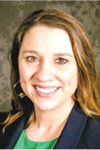 Kristi Reiff joined GEDI’s Education
and Training unit as a training
program specialist in June 2023. Reiff
is a two-time graduate of Auburn
University, receiving a Bachelor of
Science in health administration
and a master’s degree in higher
education administration. She has
spent time working as a volunteer
and professional in county, state and federal
government roles. In her spare time, Reiff serves as an
alumnae advisor for a Panhellenic organization and
a board member for the Junior League of Lee County.
She lives in Auburn with her husband, Stephen, and
two children.
Kristi Reiff joined GEDI’s Education
and Training unit as a training
program specialist in June 2023. Reiff
is a two-time graduate of Auburn
University, receiving a Bachelor of
Science in health administration
and a master’s degree in higher
education administration. She has
spent time working as a volunteer
and professional in county, state and federal
government roles. In her spare time, Reiff serves as an
alumnae advisor for a Panhellenic organization and
a board member for the Junior League of Lee County.
She lives in Auburn with her husband, Stephen, and
two children.
 Nicole Stafford joined the GEDI
team in June of 2023 in the role
of training program specialist.
Previously, she spent six years at
the Harbert College of Business as
an admissions advisor. She earned
both her bachelor’s and master’s
degrees from Auburn and is a fourth-
generation Auburn alumnus. Stafford
is an avid supporter of the arts, is passionate about
lifelong learning, and embraces the cultural and
educational opportunities the Auburn-Opelika areas
provide. She grew up in Auburn and is delighted to be
back on the Plains among friends and family.
Nicole Stafford joined the GEDI
team in June of 2023 in the role
of training program specialist.
Previously, she spent six years at
the Harbert College of Business as
an admissions advisor. She earned
both her bachelor’s and master’s
degrees from Auburn and is a fourth-
generation Auburn alumnus. Stafford
is an avid supporter of the arts, is passionate about
lifelong learning, and embraces the cultural and
educational opportunities the Auburn-Opelika areas
provide. She grew up in Auburn and is delighted to be
back on the Plains among friends and family.

Birthday parties that celebrate, educate and administer health screenings to senior citizens. A design suite of logos and signage to attract tourists to a county park. Training in grant writing to obtain funding for community programming.
These are just a few of the outcomes in place following the 2023 Auburn Across Alabama Experience.
Now in its second year, Auburn University Outreach has hosted Auburn Across Alabama in collaboration with Alabama Cooperative Extension System to gather faculty, staff and Extension coordinators together with community partners to listen and learn about the assets and challenges Alabamians are facing locally as well as immerse themselves in the beauty of the communities across the state. This vision was conceptualized by Royrickers Cook, vice president for University Outreach and associate provost, along with Chippewa Thomas, director of the Office of Faculty Engagement, with the vision realized and implemented by Hollie Cost, assistant vice president for University Outreach and Public Service, and Bernard Hill, director of corporate and community partnerships.
To date, more than 50 faculty and staff across the colleges at Auburn University have visited Macon, Montgomery, Dallas, Lee and Chambers counties, with particular focus on the communities in Selma, Tuskegee, Montgomery, Lanett, LaFayette, Loachapoka and Opelika.
Cost notes, “The beauty of this experience is the relationships that evolve between university faculty and community members and leaders, demonstrating that relationships, coupled with action result in sustained community growth and development.”
“In each community, we pull together a group to help us tour the town and engage in a roundtable to identify challenges in three main areas: education, health disparity and economic development,” said Callie Nelson, assistant director of field operations for Alabama Extension. “We work with the local Extension coordinators to identify the key players in their communities who should be at the table, including elected officials, county commissioners, the mayor, chamber of commerce officials, family resource and community center staff.”
Armed with community leaders as their guides, the Auburn Across Alabama participants toured primary and secondary schools and local colleges. They learned about food insecurities and lack of funding for community programming to address health care and economic development initiatives, opportunities and needs.
“Our goal is to take research-based information and apply it in the field. This program helps identify what are the needs in that county and then bring the university resources to bear on those needs,” Nelson said.
The result of the Auburn Across Alabama tours: Auburn University faculty and staff discovered the community needs and assets are as diverse as the communities themselves. Their mission is to collaborate with the communities and bring the full force of their research and creativity to address specific challenges, while increasing faculty awareness of the incredible assets in each of these communities.
Partnership expands practical parties for seniors
“It’s the networking component of Auburn Across Alabama that’s been the most helpful,” said Janice Hall, an Extension coordinator in Macon County. “The community members come together with university faculty and staff to brainstorm and address challenges they are facing. One of the things to come out of the Auburn Across Alabama partnership is expanding the Let’s Celebrate and Educate program.”
Let’s Celebrate and Educate is a birthday party program for senior citizens offered by Alabama Extension. Beyond a group birthday party, the program offers education on health care benefits and legal services.
“We bring representatives to discuss Medicaid and Medicare benefits, so they know what they qualify for. And we partner with Legal Services Alabama to provide free attorney services for wills, power of attorney and health care directive preparation,” Hall said.
Following participation in Auburn Across Alabama, Linda Gibson-Young, East Alabama Medical Center/ Dr. Bill Lazenby Endowed Professor and outreach coordinator in the College of Nursing, partnered with Macon County Extension to bring nursing students to the Let’s Celebrate and Educate parties. The students provide health care screenings for the seniors.
“The Auburn and Tuskegee nursing students get hands-on practice with blood pressure checks and glucose screenings, and the seniors get extra TLC at their birthday party,” said Hall. “The students also create templates for individual emergency medical notebooks. We help the seniors create notebooks that include all their medical information, social security letters, health screenings and more in one binder for a caregiver or loved one.”
In addition, Auburn Across Alabama helped secure sponsorship through the Macon County Economic Development Authority and AuburnBank, allowing Extension to offer two out of the six Let’s Celebrate and Educate programs in different parts of the county.
“Auburn Across Alabama bridges the gap between the universities and representatives in the counties and towns,” Hall said. “It’s been a successful way to bring the key people on all sides together to help communities thrive.”

Design partnership to increase Tuskegee tourism
During the first Auburn Across Alabama bus tour in 2022, Robert Finkel, program chair and associate professor of graphic design in Auburn’s College of Architecture, Design and Construction, learned that one of the main challenges facing the Tuskegee community is how to make it a destination for tourists and help revitalize its economy. More visitors leads to more people eating in restaurants, shopping and contributing to the town’s livelihood.
“When you enter town, you pass by a park called Lake Tuskegee-Ford. One of the people from Tuskegee on the bus commented on how they wished there was a way to bring more visitors there,” Finkel said. “The idea of how to help hit me.”
This semester, Finkel and 15 of his junior design students traveled to Tuskegee, where they met with Mayor Lawrence Haygood and Councilman John Ford to talk about how they could help design new park signage to help draw visitors to Lake Tuskegee-Ford and the city of Tuskegee.
“In cooperation with the local panel, my students are working to develop a new logo and wayfinding signage concepts for the park to help build a strong sense of place and recreation to the lake,” Finkel said. “That is a tangible thing that’s come out of Auburn Across Alabama. I’m really excited to engage my students on the project, and it would’ve never come about had I not been on the bus and not just hearing somebody driving by it and overhearing the comment of, ‘Hey, we’ve got this great lake here. I wish we could do something with it.’”
The five-week project kicked off in early October when the students met with key stakeholders and toured the lake, learning about the lake’s history, finding visual inspiration and discovering unique attributes that can be translated into visual concepts.
“The students are learning that they have to build collaborative relationships in their design work. That partnership, and being empathetic to the community’s needs and goals, is important,” Finkel said.
Over the course of the project, the student teams developed a core identity for the park, including logos, color palettes and typographic systems. They also created a master site map with iconography, legend and trails, as well as site identification signage and trail directional sign system. The students will present the designs at the Tuskegee Municipal Complex in the near future.
“The next steps are to assist the community with identifying fabricators and vendors, developing a production budget and assisting them with grant writing to obtain funding,” Finkel said.
Up next: more listening, learning, collaborating
As Outreach and Extension staff plan for next year’s bus tour, they are continuing discussions about how to partner with local communities. Many goals were outlined following a reception of all the participants, including working with Chambers County Schools to foster an ACT tutoring program, working with downtown LaFayette to install new murals and developing a grant writing program to help communities apply for and receive vital funding to help with programming needs.
Auburn University Outreach remains committed to making a significant impact for individual communities across the state. Auburn Across Alabama will continue the necessary step of visiting, listening and learning across all 67 counties, engaging at the local level to work together on addressing the challenges and learning more about the amenities individual to those communities.
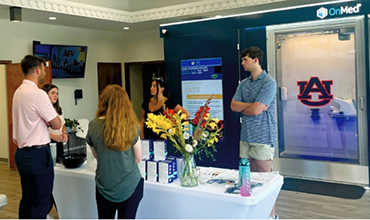
The Alabama State Department of Finance has granted Auburn University $2 million to fund an ambitious health care access initiative aimed at addressing significant health disparities across rural Alabama. Auburn University Outreach, in collaboration with the colleges of Pharmacy, Nursing, Human Sciences and the Alabama Cooperative Extension System, first pioneered this groundbreaking project in Chambers County, Alabama.
Auburn University’s Rural Health Initiative will expand its transformative health care access model to combat health disparities in rural Alabama. This novel approach merges cutting-edge telehealth technology provided by OnMed with hands-on wellness care delivered by Auburn faculty and students specializing in health-related fields. The state-of-the-art OnMed telehealth station offers affordable, private and efficient health care access to patients.
This technology facilitates real-time patient encounters with licensed clinicians, bringing quality health care to individuals in underserved areas. The Chambers County Community Wellness Center, which opened its doors in February 2023, is the project’s inaugural site, providing health care services during times when traditional health facilities are typically closed.
“Our center in Chambers County has touched so many lives in that community. Our vision was to learn from this experience alongside the community so we could continue expanding the work through our partnership with Alabama Cooperative Extension System, other disciplines across campus and university and community partners across the state,” said Hollie Cost, assistant vice president for University Outreach and Public Service and project director for the initiative. “These funds will enable us to do that with the anticipated outcome of remapping the rural health landscape and improving the quality of life across rural Alabama.”
The $2 million grant will be used to replicate this health care model across various rural Alabama communities, with an emphasis on addressing each community’s unique needs. Communities will be selected and prioritized based on accessibility limitations, availability of facilities, community support and low rankings on health factors and health outcomes.
“The funds provided by the Alabama Department of Finance through ARPA will enable us to work toward our goal of equitable health care access across rural Alabama,” said Royrickers Cook, vice president for University Outreach and associate provost. “The center we’ve established in Chambers County collaboratively with the Alabama Cooperative Extension System, other colleges across campus and Chambers County community members and leaders enabled us to refine a model to replicate in these underserved areas throughout the Black Belt. We are especially enthusiastic about the opportunity to partner with other universities and health care service providers to deliver high-quality health care and health education to our neighbors.”
Leaders in the Extension system are identifying ideal locations in these communities by collaborating with local leadership. This approach will enable Auburn University and the Alabama Cooperative Extension System to remain fully engaged in developing health programs that address the unique needs identified through patient visits to the telehealth station.
Paul Brown, associate director for the Alabama Cooperative Extension System, added, “The Rural Health Initiative is all about public-private partnerships that, when leveraged, increase reach and impact. Our presence in all 67 counties, combined with strong ties to University Outreach and college partners, makes Extension the ‘great connector’ between academic institutions and Alabama communities. Extension faculty are experts in the engagement processes and subject matter content and are committed to fostering interdisciplinary and collaborative approaches to improve health and well- being.”
Auburn’s dedicated faculty and students from various disciplines will deliver health and wellness education and services tailored to each community’s specific needs. Disciplines currently involved in the initiative include nursing, pharmacy, health sciences, speech, language and hearing. Services provided encompass a wide range of health care needs, including but not limited to COVID-19 and infectious diseases testing and vaccinations, speech and hearing evaluations, maternal health care education, nutrition planning, diabetes management, medication management and asthma management
Linda Gibson-Young, a nursing professor, outreach coordinator and the initiative’s health services director, notes that, “health services in rural environments have a profound impact on the well- being and quality of life of residents. This model adds accessible and high-quality health care to improve health outcomes by addressing preventive care, early intervention and management of chronic conditions.”
The $2 million funding award will support telehealth station installation and leasing, staffing needs, health and wellness programming, community engagement, program promotion and project administration. Communities chosen for the project will be expected to address necessary facility improvements, internet and utility expenses.
A conservative project estimate indicates that the allocated funds would sustain four health and wellness centers for two years. This project is being supported, in part, by federal award number SLFRP2635 awarded to the State of Alabama by the U.S. Department of the Treasury. Additional funding sources are being considered and solicited.
For more information about the Auburn University Rural Health Initiative, contact Hollie Cost at (334) 740-2897 or hac0043@auburn.edu

Through a guarded fence in Athens, Greece, nurse Allie Loehr gazes on a maze of shipping containers and the diverse faces of refugees from Ukraine, Iran, Iraq, the Democratic Republic of the Congo and Afghanistan, among others.
“It was nothing like I expected, though I didn’t know what to expect,” Loehr shared. A 2022 graduate of Auburn’s College of Nursing, Loehr is one of 50 students, faculty and alumni who traveled to Greece for the Auburn University Office of Outreach Global Healthcare Service-Learning trip this summer. “The containers each had a different purpose: a school, an office, a health clinic. Others were homes. Our job was to knock on doors, give people information about health testing and encourage them to visit the medical office. Though many of them spoke multiple languages, most of our communication was through gesturing and handing out pamphlets.”
The 10-day program partnered with nonprofit Doctors of the World, Greece, and local community leaders in Athens to address the health care needs of underserved communities. Auburn students shadowed the doctors and helped administer health care services during the unique service-learning BEYOND AUBURN WINTER 2023 35 and cultural immersion opportunity. Participants hailed from Auburn’s College of Nursing, Harrison College of Pharmacy, College of Education, College of Mathematics and College of Forestry, Wildlife and Environment.
“Refugees are a really misunderstood population and to have encountered them in such close quarters and to get to take care of them really was a privilege,” Lalah Rose Hasbrouck said. Hasbrouck graduated with her nursing degree from Auburn in August and is starting her master’s in child life sciences. “It impacted how I approach health care here in the United States.”
Beyond assessing health care needs in the refugee camp, the students and support staff participated in street work to administer health care to the homeless and other underserved populations in Athens. Students shadowed doctors, developed clinical skills and deepened their understanding of global health challenges.
“The street work was my favorite part. It broadened my understanding of what health care is, what it looks like,” Hasbrouck said. “We talk about cultural competency and embracing diversity. Doctors of the World, Greece, focuses on the humanitarian approach to care. The Auburn Creed is to have that human touch in all that we do, and that was really present in our work in Greece.”
“Doctors of the World, Greece, went above and beyond to make opportunities for us,” Loehr agreed. “We worked with and learned from social workers, pharmacists, doctors and nurses. The communication barriers were not unlike some that I experienced with patients in the United States, and I learned so much about how resourceful community health care workers can and have to be when there are not supplies at hand.”
Participants met with the mayor and deputy mayor of Athens to learn about how the government partners with nonprofits like Doctors of the World, Greece, to address the humanitarian needs of refugees, homeless and underserved citizens in Athens.
“Meeting the mayor and the deputy mayor of Athens was an awesome experience,” Jaylynn Fortenberry said. The Greece trip was the first time Fortenberry, a pharmacy student, had traveled outside of the U.S. “I could tell that they really cared about what they were doing and were open to finding solutions for the refugees and homeless from health care to getting them settled in Greece or helping them travel to another safe country.”
“It was eye-opening. We worked with families fleeing their countries due to terrorism. We worked with children who will never go home,” Fortenberry continued. “I think the more people who can experience a trip like this will help them develop more compassion for other countries and people going through this abroad and in the United States.”
This type of perspective is what Auburn University’s Office of Outreach Global, a unit under University Outreach, strives to provide. The office creates opportunities for global engagement, cultural immersion experiences and contributions toward community development across the globe. The goal is to create affordable, short-term service-learning experiences to make education abroad accessible for more students. Beyond their service work, students also traveled to historical landmarks in and near Athens, including the Acropolis, the Parthenon and Delphi.
“We live in a global village,” said Elisabeth I. Quansah, director of Auburn University Office of Global Outreach. “Our students need to be holistic, and one way is to expose them to diverse populations, multicultural education and community outreach in an international program.”
Global Outreach will offer the Greece Service-Learning Program in Health again March 1-9, 2024, and the Ghana Service-Learning Program June 21 - July 2, 2024. Visit auburn.edu/outreach/global for more details.
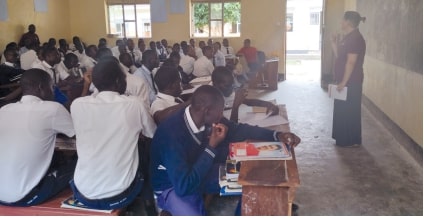
This summer, Gail Harper Yeilding traveled with a group of teachers and professors to Lira, Uganda, to engage in a Fulbright-Hayes Small Group Experience supported by the United States Department of Education, Penn State University, Auburn University and Fields of Hope. The project included monthly meetings with teachers and Ugandan school partners for six months prior to travel, a month of immersion in Uganda and follow-up meetings with school partners throughout the year. Throughout the journey, the group reflected daily using Taranth’s (2014) TIPS method, which included daily reflection on one thing, idea and person along with self-reflection. The group traveled by bus throughout the country for a month, with stays in Kampala, Sipi Falls, Lira and Murchison Falls.
While in Lira, Yeilding located a family from “The First 1,000 Days” by Roger Thurow, Brenda, Dennis, Aron and more. This moment was pivotal in making words on a page come alive.
“Merely two years ago, I had only read about Brenda’s pregnancy and the birth of Aron in the book, and I was able to sit with her family in their village and tell her how inspiring she is and how students in the U.S. are learning about her story through the Learning Through Storytelling curriculum.”
According to Yeilding, the purpose of the trip was to engage with school partners and Fields of Hope in completing mini-grants to begin agriculture projects at five partner schools in Lira.
“At our school, we welcomed 250 chicks by preparing a brooder on campus as well as discussing care, record keeping and student leadership with the students and a team of teachers,” said Yeilding. “ I also taught a lesson on fruit planting in which we learned about six methods and then planted tomato seedlings in each method at the school garden. I stay connected with our partner teachers to learn which experiment worked best by producing the most fruit. I also worked with the English department to engage in debates surrounding climate change, sustainable development goals and food security, as well as writing up a report on students’ recommendations for the poultry project.”
The team visited other schools and farms to learn more about Uganda’s commitment and innovations in agriculture. These visits included MST One Acre School, Gyaza School, Sipi Falls and Coffee Farm Tour, Iowa State Center, St. Mary Magdalene, two Fields of Hope projects in villages, Murchison Falls State Park, Soccer Without Borders Youth Center, and Ziwa Rhino Sanctuary. They also spent a day in Kole village working in a small group with Katie, a Ugandan mother of seven, to engage in her daily chores and learn about the village’s work implementing a Fields of Hope grant.

It is a seasonably hot and humid August morning in a small East Alabama town, and Cameron Willis prepares for his day. There is a lot on the to-do list for the 18-year-old who just graduated from high school. Willis heads into his office, a space he leases in the building of a former trucking company. He will get to work designing some graphics for a new collection of merchandise he is preparing to launch. Once he wraps up his work in the office, he heads over to the local high school in time for the varsity volleyball game, just one of the many sports he is asked to photograph. When it comes to work, no two days are the same.
Willis has always believed in hard work; he rose to the top of his class as valedictorian and even had the opportunity to graduate early. Like most teens, he was not sure what the future held, but he had recently discovered his passion for photography and graphic design.
While still in high school, Cameron started designing flyers to help promote upcoming races at the nearby motorsports park where his dad organized competitions for the drag racing circuit. Motivated to learn more about design software applications and techniques used by professionals, he enrolled in the graphic design certificate program offered through Auburn’s Office of Professional and Continuing Education.
“Cameron’s decision to earn a professional credential and create his own business while in high school and graduating valedictorian of his class show great initiative and professionalism,” said Hope Stockton, assistant vice president for outreach and professional and continuing education.
“I wanted to level up what I was doing and earn a credential that would set me aside from the competition,” said Willis. “I knew the program would give me a pathway to elevate myself to another level of creativity.”
It was not long before the then high school junior had built a clientele within the racing community. He designed and sold race-themed promotional items, including custom stickers, drinkware and t-shirts. Over the next year, Willis would also start posting and selling his photography online. Today, he has expanded his business and audience, offering a variety of custom-printed products stocked and sold locally.
For the 18-year-old business owner, navigating the competition in the field of graphic design and photography continues to be his greatest challenge, but having won a few races himself, Cameron welcomes competition. “It motivates me to do better.”
When asked about the future, Willis aspires to enter the world of professional sports photography and has already been asked to photograph events for Drag Champ magazine. He says he hopes to leave a legacy through what he creates and will continue to seek ways to develop his skills.
“You don’t have to wait until you’re a certain age to start your own business,” said Willis. “Find something you enjoy and are passionate about and develop those skills. You can turn almost anything into a business if you have the drive and ambition.”
The online graphic design certificate program offered by OPCE is designed to help individuals develop skills and remain competitive in the graphic design industry and beyond. Participants learn sophisticated graphic design processes using Adobe Photoshop, Illustrator, and InDesign Creative Cloud applications. For more information, visit auburn.edu/opce/graphicdesign

Amid the war-torn landscape of Ukraine, an Auburn University graduate works daily to make a difference. Natalie Palmquist, a 2019 civil engineering graduate, works alongside her Samaritan’s Purse coworkers to ensure the delivery of safe, clean water for the people of Ukraine. Samaritan’s Purse is a nondenominational evangelical Christian organization providing spiritual and physical aid to hurting people around the world. Since 1970, Samaritan’s Purse has helped meet the needs of people who are victims of war, poverty, natural disasters, disease and famine.
Palmquist works as a WASH (water, sanitation and hygiene) program manager, focusing on the frontline areas of Ukraine that have damaged water infrastructure specifically related to the war. In some cases, damage results from shelling or actual bombing of critical infrastructure. In other cases, when people flee a community, the municipal systems no longer work as well because the maintenance is not there, and the technicians are no longer available.
Palmquist and her team install reverse osmosis water treatment units to develop alternate sources of water for communities without fully functional water supply systems. Her daily responsibilities include transferring funds to the partners on the ground who help implement the project. She also strategizes with the cadre of partners to determine where to focus their efforts. Additionally, she is involved in purchasing and shipping materials and conducting remote calls to help troubleshoot.
Understandably, working in this setting can be difficult. Palmquist faces many challenges as she conducts her work. Two of the most basic are remote project management and the language barrier. “Trying to troubleshoot and to get information from someone on the ground when you can’t get to that place on the ground is really difficult,” said Palmquist. “The language barrier is also very difficult because I cannot speak to almost any of our partners. I’m constantly working through a translator, and I have great translators, but that’s just a challenge on top of the remote management.”
However, the greatest challenge is the emotional strain of doing this work in the context of a war. Palmquist and her coworkers have concluded that since they cannot end the war, they can continue to provide much-needed help and support in a very difficult situation.
Although the work can be difficult, there are many things to celebrate. Hearing the testimonies from church partners about their growing congregations, seeing pictures of people standing in line to get clean, safe water, providing job opportunities for residents, and working with a caring supportive team are some of the rewards Palmquist sees daily.
Almost every aspect of her life has led Palmquist to this place. As a child, she traveled with her family while her parents worked with the International Church in Istanbul, Turkey. While on furlough year in the United States, her parents elected to remain in the U.S. to take advantage of educational opportunities for Palmquist and her siblings. This decision set the stage for her to attend college at Auburn.
“What got Auburn on my radar was I had done Distinguished Young Women (DYW) in Wyoming. I ended up winning the competition in Wyoming, and then came to Alabama for the national competition,” said Palmquist. “I had basically never heard of Auburn before, but they offer DYW scholarships at Auburn, so that’s what drew me to the university. Ultimately, I went on a national merit scholarship instead, but it was great to be exposed to Auburn that way.”
In addition to the exposure to Auburn through DYW, Palmquist had other interests that she considered as she selected a college to attend. “I entered Auburn because of the scholarship and the engineering program. Having grown up overseas, I always wanted to go back overseas and work in the development context,” said Palmquist. “I chose civil engineering as a degree first because I felt that could get me working overseas, maybe on water projects or structural projects; then, I chose the university based on that. I specifically only looked for schools that had active chapters of Engineers Without Borders. So, I came to Auburn ready to jump into EWB, and I did that my very first semester.”
Her experiences while at Auburn provided a foundation for the work she is doing today. As a member of EWB, Palmquist traveled to Rwanda three times doing actual development work on a small scale. In addition to her work with EWB, Palmquist participated in the Turkish Students organization. Working in these student organizations, completing a major in civil engineering and a minor in nonprofit studies combined to create the basis for the work she does now.
“Auburn set me up well to pursue this career. Auburn really cares about its students, and I felt that the whole time that I was at the university and found so many opportunities to get involved and to grow as a leader,” Palmquist said. “I already had a trajectory to travel. I think it was natural for me. I probably would have been traveling no matter which university I went to, but Auburn gave me that opportunity to travel with Engineers Without Borders. I’d love to see that grow at Auburn. I would like to see students realize they can work, live and practice their field in a totally new country with brand new connections.”
After earning her degree at Auburn University, Palmquist went on to pursue a master’s in international development studies at the University of Grenoble Alpes, a public research university in Grenoble, France. That degree required her to do an internship, which she completed with Samaritan’s Purse. After earning her master’s degree, Palmquist accepted a full-time role with Samaritan’s Purse. She started the position in Ukraine as a short-term assignment but enjoyed the work so much that she decided to stay.
Although she is not certain where the next stage of life may lead, for now, Palmquist is content to make a difference during this critical period.
“Twenty years from now there will be a lot being said about the Ukraine/Russia conflict, and I think it’s just incredible that I get to be a part of that. Never close yourself off to the international opportunities that are available for your future and for Auburn’s impact.”
Adrienne Duke-Marks received the 2023 Award for Excellence in Faculty Outreach for her work addressing risky behavior that starts in adolescence. In addition to her exemplary work, several faculty members are recognized for their outreach projects and programs.
 Jay Mittal is an
associate professor
of political science
in the College of
Liberal Arts. Mittal
takes an active role in
community outreach
with 11 collaborative
partnerships throughout
the state and beyond.
Mittal leads the
Alabama City Year
Program providing the
opportunity for students to work side-by-side with
community partners throughout the state on a host
of projects that assist communities with planning
initiatives such as local economic development,
sustainable transportation, historic preservation, and
urban design. Current classes are assisting the Lake
Martin Economic Development Alliance (LMAEDA),
comprised of three local communities - the City of
Dadeville, the town of New Site, and Horseshoe Bend
National Military Park – in regional and community-
scale, tourism-based economic development plans and
strategies.
Jay Mittal is an
associate professor
of political science
in the College of
Liberal Arts. Mittal
takes an active role in
community outreach
with 11 collaborative
partnerships throughout
the state and beyond.
Mittal leads the
Alabama City Year
Program providing the
opportunity for students to work side-by-side with
community partners throughout the state on a host
of projects that assist communities with planning
initiatives such as local economic development,
sustainable transportation, historic preservation, and
urban design. Current classes are assisting the Lake
Martin Economic Development Alliance (LMAEDA),
comprised of three local communities - the City of
Dadeville, the town of New Site, and Horseshoe Bend
National Military Park – in regional and community-
scale, tourism-based economic development plans and
strategies.
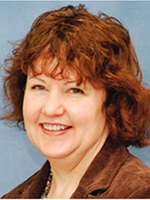 JoEllen Sefton is a
professor of kinesiology
and director of the
Auburn University
Warrior Research
Center. Sefton partnered
with the military when
Army executive officer
Major Todd Burkhardt
from Fort Moore called
for help in reducing
musculoskeletal injuries
in the 2-54 Infantry
Training Battalion. This marked the beginning of the
Warrior Athletic Training (WAT) program. Sefton then
developed the Warrior Research Center (WRC) as a
natural expansion of the WAT program. The WRC seeks
to maximize readiness through improved health and
performance. The WRC encourages collaborations
with Auburn University and local, federal, and state
government, business, and industry and improves the
national recognition of Auburn’s research capabilities.
Many U.S. Army senior leaders value her experience
and expertise and have sought her assistance in
resolving some of their challenges in ensuring safe
training for soldiers during times of war. This is
evidenced by invitations to speak and serve on
committees and working groups at the Pentagon, Ft.
Bragg, Ft. Moore, Ft. Lee, Ft. Rucker, Wright Patterson
Air Force Base, and the Australian Defense Force
Academy at Canberra, New South Wales, Australia.
JoEllen Sefton is a
professor of kinesiology
and director of the
Auburn University
Warrior Research
Center. Sefton partnered
with the military when
Army executive officer
Major Todd Burkhardt
from Fort Moore called
for help in reducing
musculoskeletal injuries
in the 2-54 Infantry
Training Battalion. This marked the beginning of the
Warrior Athletic Training (WAT) program. Sefton then
developed the Warrior Research Center (WRC) as a
natural expansion of the WAT program. The WRC seeks
to maximize readiness through improved health and
performance. The WRC encourages collaborations
with Auburn University and local, federal, and state
government, business, and industry and improves the
national recognition of Auburn’s research capabilities.
Many U.S. Army senior leaders value her experience
and expertise and have sought her assistance in
resolving some of their challenges in ensuring safe
training for soldiers during times of war. This is
evidenced by invitations to speak and serve on
committees and working groups at the Pentagon, Ft.
Bragg, Ft. Moore, Ft. Lee, Ft. Rucker, Wright Patterson
Air Force Base, and the Australian Defense Force
Academy at Canberra, New South Wales, Australia.
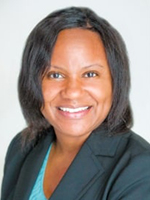 Katilya Ware is an
assistant professor in
the College of Nursing.
Ware addresses critical
needs and objectives
through a variety of
innovative methods.
The “East Alabama
Breakthrough for Youth”
program, funded through
BlueCross BlueShield,
aimed at disseminating
knowledge on stress
management and healthier coping mechanisms,
directly targets the pressing concern of vaping/e-
cigarette use in schools. Recognizing the need for
broader impact from community partners, Ware
expanded the program’s reach to include pregnant
teen or adolescent populations. Understanding the
prevalence of substance use among teen mothers and
its detrimental impact on maternal and neonatal
health, Ware extended efforts to mitigate these risks
and promote healthier pregnancies. This is
important because substance use disorder
contributed to 23% of pregnancy-related deaths
in 2022. She also collaborated with nursing faculty
to reshape and amplify the impact of the prenatal
education courses offered to community members
within the College of Nursing. The rebranded
“Perinatal Education Series” now offers comprehensive
maternal-newborn education throughout the year. In
this series, education on topics such as prenatal care,
postpartum visit attendance, mental health, and
continuum of care after delivery are provided, thus
solidifying the nominee’s commitment to community
well-being.
Katilya Ware is an
assistant professor in
the College of Nursing.
Ware addresses critical
needs and objectives
through a variety of
innovative methods.
The “East Alabama
Breakthrough for Youth”
program, funded through
BlueCross BlueShield,
aimed at disseminating
knowledge on stress
management and healthier coping mechanisms,
directly targets the pressing concern of vaping/e-
cigarette use in schools. Recognizing the need for
broader impact from community partners, Ware
expanded the program’s reach to include pregnant
teen or adolescent populations. Understanding the
prevalence of substance use among teen mothers and
its detrimental impact on maternal and neonatal
health, Ware extended efforts to mitigate these risks
and promote healthier pregnancies. This is
important because substance use disorder
contributed to 23% of pregnancy-related deaths
in 2022. She also collaborated with nursing faculty
to reshape and amplify the impact of the prenatal
education courses offered to community members
within the College of Nursing. The rebranded
“Perinatal Education Series” now offers comprehensive
maternal-newborn education throughout the year. In
this series, education on topics such as prenatal care,
postpartum visit attendance, mental health, and
continuum of care after delivery are provided, thus
solidifying the nominee’s commitment to community
well-being.
 Keith Hébert is the
Draughon Associate
Professor of Southern
Historyy and co-
director of the Public
History Program in the
Department of History.
Hébert works to address
the complicated history
of Auburn University.
His leadership in helping
Auburn University repair
the harms of slavery and
segregation is noteworthy and nationally significant.
In 2019, Hébert traveled with a group of faculty to
visit Harold Franklin, the student who desegregated
Auburn University. More than 50 prior, Franklin
had begun his graduate degree in history but never
completed it. Since 2016 he and Richard Burt of the
College of Architecture, Design, and Construction
(CADC), have led an effort to identify “foot soldiers”
from the Selma to Montgomery March in 1965. These
are the often-unheralded people who took part in
one of the signature events of the civil rights struggle
in America. Burt and Hébert started with a simple
question: “What were the names of the marchers who
participated in Bloody Sunday?” That initial question
has spawned several significant grants and initiatives
in the intervening years. In addition to the ongoing
partnerships with CADC and Selma University,
Hébert has overseen an oral history project (three
public exhibits), and a teacher institute funded by the
National Endowment for the Humanities.
Keith Hébert is the
Draughon Associate
Professor of Southern
Historyy and co-
director of the Public
History Program in the
Department of History.
Hébert works to address
the complicated history
of Auburn University.
His leadership in helping
Auburn University repair
the harms of slavery and
segregation is noteworthy and nationally significant.
In 2019, Hébert traveled with a group of faculty to
visit Harold Franklin, the student who desegregated
Auburn University. More than 50 prior, Franklin
had begun his graduate degree in history but never
completed it. Since 2016 he and Richard Burt of the
College of Architecture, Design, and Construction
(CADC), have led an effort to identify “foot soldiers”
from the Selma to Montgomery March in 1965. These
are the often-unheralded people who took part in
one of the signature events of the civil rights struggle
in America. Burt and Hébert started with a simple
question: “What were the names of the marchers who
participated in Bloody Sunday?” That initial question
has spawned several significant grants and initiatives
in the intervening years. In addition to the ongoing
partnerships with CADC and Selma University,
Hébert has overseen an oral history project (three
public exhibits), and a teacher institute funded by the
National Endowment for the Humanities.
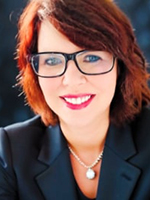 Kimberly Braxton
Lloyd is the associate
dean for Clinical Affairs
and Outreach in the
Harrison College of
Pharmacy (HCOP).
She led the design and
development of HCOP’s
Office of Clinical Affairs
and Outreach (HCOP
CAO). This HCOP office
was newly established in
2019 to augment Auburn
University’s outreach mission in accordance with
Auburn’s stated definition “…of applying academic
expertise to the direct benefit of external audiences
in support of university and unit missions.” The
specific mission of HCOP CAO has been to develop
and train a collaborative interdisciplinary team of
health professions students and healthcare providers
that work seamlessly to provide the highest quality
medical and pharmacy services for patients. HCOP
CAO strives to optimize the economic, clinical, and
humanistic outcomes of medication use and wellness
interventions among all Alabamians.
Kimberly Braxton
Lloyd is the associate
dean for Clinical Affairs
and Outreach in the
Harrison College of
Pharmacy (HCOP).
She led the design and
development of HCOP’s
Office of Clinical Affairs
and Outreach (HCOP
CAO). This HCOP office
was newly established in
2019 to augment Auburn
University’s outreach mission in accordance with
Auburn’s stated definition “…of applying academic
expertise to the direct benefit of external audiences
in support of university and unit missions.” The
specific mission of HCOP CAO has been to develop
and train a collaborative interdisciplinary team of
health professions students and healthcare providers
that work seamlessly to provide the highest quality
medical and pharmacy services for patients. HCOP
CAO strives to optimize the economic, clinical, and
humanistic outcomes of medication use and wellness
interventions among all Alabamians.
 Sara Dunn Stanwick is an associate professor
in the Harbert College
of Business. Stanwick
established the largest
outreach program in
the College, Tiger$ense,
and continues to engage
children and adults as
they learn about financial
concepts that will help
change the trajectory
of their lives. It was her
original idea to begin the program to benefit children
in our community through interactions with AU
students while learning financial well-being concepts.
Stanwick is the director of financial literacy activities
in the Auburn University School of Accountancy (SOA)
and has served in this capacity since the program’s
inception during the 2011-2012 academic year.
Sara Dunn Stanwick is an associate professor
in the Harbert College
of Business. Stanwick
established the largest
outreach program in
the College, Tiger$ense,
and continues to engage
children and adults as
they learn about financial
concepts that will help
change the trajectory
of their lives. It was her
original idea to begin the program to benefit children
in our community through interactions with AU
students while learning financial well-being concepts.
Stanwick is the director of financial literacy activities
in the Auburn University School of Accountancy (SOA)
and has served in this capacity since the program’s
inception during the 2011-2012 academic year.
 Sean Forbes is a
professor in the College
of Education. Forbes
established and sustains
a community gardening
partnership that
leverages community and
university resources to
enhance food security
and engages PK-12
students and teachers
in Opelika City Schools
while improving student
outcomes. O-Grows, which has been in place for
more than 10 years, models an interdisciplinary
approach that connects core academic standards to
the universal relevance of food systems, food security,
and food business with gardens, greenhouses, and a farmer’s market.
Sean Forbes is a
professor in the College
of Education. Forbes
established and sustains
a community gardening
partnership that
leverages community and
university resources to
enhance food security
and engages PK-12
students and teachers
in Opelika City Schools
while improving student
outcomes. O-Grows, which has been in place for
more than 10 years, models an interdisciplinary
approach that connects core academic standards to
the universal relevance of food systems, food security,
and food business with gardens, greenhouses, and a farmer’s market.
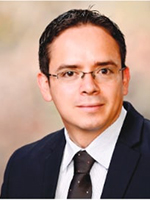 Wilmer Pachecois
an extension specialist
and associate professor
in the College of
Agriculture. Pacheco
conducts outreach
that has provided
excellent visibility to the
Department of Poultry
Science and the College of
Agriculture. A significant
accomplishment has been
establishing a partnership
between Zamorano University and Auburn University.
The collaboration has enabled Poultry Science
interns, visiting scholars, and graduate students to
play a vital role in the research enterprise, providing
a substantial impact to several research programs
while providing these students with excellent
educational opportunities. This partnership has
expanded beyond the Department of Poultry Science
to other departments within the College of Agriculture.
Pacheco and colleagues in the College of Agriculture
collaborated with the World Poultry Foundation
to conduct training focused on nutrition, poultry
diseases, and poultry housing in Havana, Cuba.
With the College of Agriculture, he also participated
in poultry management training with faculty from
Adekunie Ajasin University and Federal University of
Technology, Akure in Nigeria. In addition, he has been
involved with the Poultry Science Association annual
meeting and the International Poultry Scientific
Forum.
Wilmer Pachecois
an extension specialist
and associate professor
in the College of
Agriculture. Pacheco
conducts outreach
that has provided
excellent visibility to the
Department of Poultry
Science and the College of
Agriculture. A significant
accomplishment has been
establishing a partnership
between Zamorano University and Auburn University.
The collaboration has enabled Poultry Science
interns, visiting scholars, and graduate students to
play a vital role in the research enterprise, providing
a substantial impact to several research programs
while providing these students with excellent
educational opportunities. This partnership has
expanded beyond the Department of Poultry Science
to other departments within the College of Agriculture.
Pacheco and colleagues in the College of Agriculture
collaborated with the World Poultry Foundation
to conduct training focused on nutrition, poultry
diseases, and poultry housing in Havana, Cuba.
With the College of Agriculture, he also participated
in poultry management training with faculty from
Adekunie Ajasin University and Federal University of
Technology, Akure in Nigeria. In addition, he has been
involved with the Poultry Science Association annual
meeting and the International Poultry Scientific
Forum.

Hospital readmission soon after discharge is an ongoing problem that plagues both patients and health care systems. For those dealing with chronic diseases or a combination of health issues, the risk for readmission increases. Hospital readmission can be costly for both the patient and the hospital and contributes to poor health outcomes.
To address this issue, a team from the Auburn University Harrison College of Pharmacy and East Alabama Health are collaborating to develop solutions for improving the transition of care from hospital to home.
Headed by Dr. Kimberly Braxton Lloyd, associate dean for clinical affairs and outreach, or CAO, and Dr. Courtney Gamston, a professor of practice within CAO and an ambulatory care specialist, the interprofessional team is supported by a $683,910 two-year grant from the Food and Drug Administration’s Center for Drug Evaluation and Research Safe Use Initiative.
Early hospital readmission is a significant issue in health care, accounting for more than $17 billion in health care spending each year. Readmission is commonly caused by patient confusion concerning their discharge plan, especially with medication instructions. This confusion can cause medication non-adherence or errors, leading to loss of disease control and readmission.
“Approximately 14% of patients are readmitted to the hospital within 30 days of discharge, often due to preventable medication-related issues,” said Braxton Lloyd. “This research seeks to develop a model for the provision of post-discharge support that is not only effective but feasible and sustainable in real-world settings.”
To address the problem, the team is completing a two- year project titled “Assessment of a pharmacist-led interprofessional transitions of care program targeting patients with multiple recent hospital admissions,” or the ICARE Program. The goal of the project is to improve the care of patients who have a recent history of multiple admissions by identifying and addressing medication-related problems and barriers to care to decrease the rate of hospital readmission.
The Harrison College of Pharmacy, or HCOP, is fortunate to have a partner like East Alabama Health nearby and willing to collaborate.
“AU and EAMC have successfully partnered in many ways over the years to enhance patient care services through collaborative outreach and research and are both committed to advancing this partnership,” said Braxton Lloyd.
After reviewing a list of 20 patients from EAMC with a history of frequent hospital admissions, Gamston and Braxton Lloyd were able to put together a proposal and receive funding from the FDA to develop, implement and evaluate a process of care that provides post-discharge support for patients by leveraging the services provided by CAO’s pharmacist- led ambulatory care clinic.
For the project, the team identified patients who were admitted to the hospital at least three times in the last year and/or have heart failure and were discharged back into the community setting. Patients were chosen for their high risk of readmission to the hospital following discharge because of the complex nature of their medical conditions and treatments.
Along with the conditions themselves, patients also typically have other associated challenges, such as multiple daily medicines, lack of transportation, need for financial assistance and/or poor access to adequate nutrition. The service employed an outpatient social worker to help address social needs identified by the team to help remove barriers to optimal patient care.
As part of the transitions of care program, a pharmacist follows up with the patient four times by phone within 30 days of discharge for reminders and assessment of medication-taking and self- care behaviors while also evaluating for signs and symptoms indicating the need for additional care.
A social worker also contacts each patient by phone to evaluate social risks and the need for connection to community resources, including transportation, food bank and other nutrition services, patient assistance programs and any others that may come up.
More than a year and a half into the program, the team is seeing a significant positive impact on readmission rates for service participants.
“We have consistently found that when patients who are at high risk for readmission are discharged into the community setting and participate in at least one outpatient visit with our care team, their risk for being readmitted to the hospital within 30 days is nearly cut in half compared to those who enroll in the service but never complete an outpatient visit,” said Gamston.
Through the process, the team also found that for patients who are discharged with a medication regimen different from what they were on prior to admission, there is a large risk for medication errors due to miscommunication, misunderstanding and barriers to obtaining their new medications. To fully address these issues, the team found that home visits are sometimes needed to provide patients with comprehensive education and support. The CAO pharmacists and social worker meet with the patient in their home to review the discharge medication plan and compare it to the way the patients are actually taking their medications post-discharge.
The care team listens closely to the patient and helps organize the patient’s medications so that outpatient adherence is maximized. The care team also contacts the patient’s community pharmacies to assist with medication reconciliation and ensure that discontinued medications are noted in the pharmacy’s computer system.
“In just over a year, the incredible need for this service has been highlighted, and we have seen that the addition of post-discharge support is instrumental in decreasing the likelihood of early hospital readmission,” said Braxton Lloyd. “Working as a team, the pharmacist, social worker and other health care providers are able to improve appropriate use of medications, identify and resolve barriers to care, and address social determinants of health, leading to improved overall patient health and decreased health care costs.
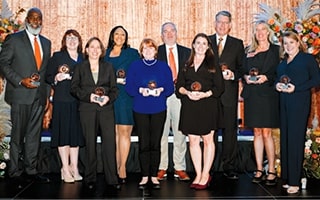
Rural Health Initiative: University Outreach, Harrison College of Pharmacy, College of Nursing, College of Human Sciences and the Alabama Cooperative Extension System.
Jointly led by University Outreach and the Alabama Cooperative Extension System with partnering academic units, including the College of Human Sciences, College of Nursing and Harrison College of Pharmacy, the Rural Health Initiative, or RHI, strengthens Auburn’s capacity to address health care access and improve health outcomes among Alabama’s rural and underserved populations. The collaboration aims to remap the health and wellness landscape to generationally impact the health of rural Alabamians, positioning Auburn as the state leader in rural health care. This unique collaboration provides authentic clinical experiences for Auburn students, preparing them for future careers in health care.

Recognizing a need to address barriers to medication in their community, Harrison College of Pharmacy students Briley Graves and Lila Parrish are working together on a project to identify and help those in need.
Supporting Graves and Parrish in their project is the Albert Schweitzer Fellowship of Alabama. The pair were named Schweitzer Fellows in the spring, and the program is their fellowship project. Alabama Schweitzer Fellows are competitively chosen from students enrolled in graduate and professional schools around the state who demonstrate a passion for cultivating positive change in Alabama communities where the need is greatest.
Working through the Stanton Road Clinic in Mobile, they are designing and implementing a screening tool based on social determinants of health. In addition to establishing this tool at the clinic, their project aims to connect patients with community resources to aid them in overcoming identified barriers.
“To best assist clinic patients with their barriers to medication access, we knew that we needed a targeted, efficient method to collect information,” said Graves, a native of Decatur, Alabama. “Unfortunately, our research into a screening tool focused on overcoming barriers to access was not as fruitful as we had hoped. Most available tools address medication adherence but do not provide a means to discover the causes behind poor adherence.”
Their tool is a Social Determinants of Health, or SDOH, screening questionnaire specifically focused on identifying barriers to medication access.
“The questions had to be specific enough to identify areas of need amongst the patient populations of Stanton Road Clinic, but also be short enough in question length and quantity to encourage participation,” said Parrish, a native of Valdosta, Georgia.
The Stanton Road Clinic is a resident-run outpatient clinic housed under the USA Health System and is nested in a community identified by the University of South Alabama Center for Healthy Communities as one of 13 “struggling Mobile communities,” providing an ideal setting for their program.
“The main reasons I feel like we chose Stanton Road Clinic were because of the variable patient population and the compassionate approach taken by the staff at the clinic,” said Parrish. “A good many of the patients who frequent the clinic are uninsured, underinsured or self-pay patients living below the federal poverty line who are in desperate need of health care services and medication.”
One of the main factors related to positive health outcomes is having access to medication and regularly taking the medication. Common barriers can be health literacy, transportation, physical ability and cost, among others. By identifying the barriers to medications to patients, Graves and Parrish work alongside community health and social workers who can work with connecting patients to various community resources and programs.
“Failure to take prescribed medications can lead to more emergency exacerbations, further deterioration of current co-morbidities, and even new the development of new co-morbidities for the patient,” said Parrish. “Being able to connect individuals to these resources will hopefully not only improve individual health but also lead to lower health care costs in the community with lower absenteeism and higher productivity in the workplace.”
The two also feel that pharmacists are uniquely positioned within the health care system to assist patients with these barriers and help with medication access.
“I believe that pharmacists occupy a unique space in healthcare where we are known as the ‘medication experts’ by both patients and colleagues,” said Graves. “When a patient has trouble accessing their medication, I want them to feel comfortable sharing this with me and be confident that I have the skills to help them.”
The long-term goal for the project is to offer the screening tool at the Stanton Road Clinic and other clinics within the USA Health system and Mobile area.
“Implementing a project of this nature in Mobile County has been a blessing to my soul,” said Parrish. “I feel a two-part reward from this experience. On one side, I get to actively assist in the overall health outcomes of patients, and on the other, I am advocating for the field of pharmacy and its future.”
Echoing her partner, Graves is thankful to the Schweitzer Foundation of Alabama and the opportunity to make a difference in their community.
“I was overjoyed to first learn that I was accepted into ASF and then to realize that my project would address a true need for patients in my community,” said Graves. “I am originally from North Alabama, but Mobile has been my home for more than six years. It is important to me to give back to the city and those who live here, and it is even more meaningful for me to serve in a way that aligns with my love of pharmacy.”
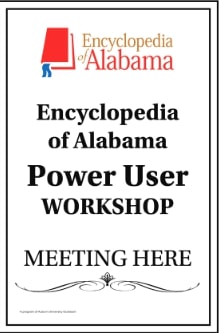
The 2022-23 school year was barely over for Alabama K-12 teachers when 17 of them became students themselves as participants in workshops featuring the online Encyclopedia of Alabama (EOA). In June, the educators attended the “Become an EOA Power User” workshops developed by the Office of Faculty Engagement. The sessions addressed ways the participants could align EOA content with their subject’s state standards and incorporate it in classroom activities.
The workshops, which were offered with the option of either in-person or remote attendance, were delivered through Alabama Department of Education Regional Inservice Centers. The first was held with the AU East Alabama Inservice Center, on the Auburn campus. The second session took place at the Jacksonville State University Inservice Center campus in Anniston. Participants who completed the workshop and evaluation were eligible for a stipend and micro- credential. They could also claim an “EOA Power User” electronic badge indicating participation in the workshop.
In a post-workshop evaluation, one participant wrote: “I plan to use EOA for building my content knowledge before teaching any subject matter [and] helping my students to become independent researchers and explorers.”
The Office of Faculty Engagement, under the direction of Chippewa M. Thomas, organized the pilot workshops, which were funded by support for EOA from the Alabama State Department of Education. Gail Harper Yeilding, a doctoral student in curriculum and teaching in the College of Education and graduate research assistant with Faculty Engagement, created the syllabus and led the sessions. Yeilding demonstrated a mobile app trivia game that can be populated with questions rooted in EOA content and reviewed a list of EOA articles that support state standards for history and language arts. Laura Hill, EOA’s communications editor, introduced the participants to the free online reference resource by highlighting EOA’s content and features, demonstrating the options for navigating the site, and emphasizing elements that support media literacy lessons.
The value of EOA in the classroom is underscored in this comment from a workshop evaluation: “Educators can design interactive learning activities based on content from [the] Encyclopedia of Alabama. For example, they could create quizzes, discussion prompts, or project-based assignments that require students to explore the articles, engage critically with the information, and apply their knowledge to real- world contexts.”
EOA was also on the program for the “New Teacher Institute, Level Up! 2023” hosted by the University of Alabama-Birmingham Inservice Center, also in June. More than 20 teachers attended the session entitled “‘I Didn’t Know That Existed!’ Encyclopedia of Alabama,” at Shades Valley High School. Participants were shown EOA’s distinctive features, introduced to ways to assess EOA in terms of authority, relevance, accuracy and purpose, and given examples of how other educators have used EOA for their lessons.
The Encyclopedia of Alabama, which is administered by University Outreach, is the state’s premier online resource for information on Alabama’s history, culture, geography and natural environment. It is available for free from any device connected to the internet. To explore EOA, visit EncyclopediaofAlabama.org.

Managing mental health can be a challenge for anyone, but especially young girls experiencing physical and emotional changes. Wanting to provide support for this population of young women, Harrison College of Pharmacy students Kiaira Anderson and Maia Singleton are working together to build a program that helps adolescent females in underserved areas grow in the maturation of society and developments in life that align with improving social- emotional skills.
Supporting Anderson and Singleton in their project is the Albert Schweitzer Fellowship of Alabama. The pair were named Schweitzer Fellows in the spring, and the program is their fellowship project. Alabama Schweitzer Fellows are competitively chosen from students enrolled in graduate and professional schools around the state who demonstrate a passion for cultivating positive change in Alabama communities where the need is greatest.
Their project is called B.L.O.O.M., which stands for Becoming a Loving, Open-Minded, Optimistic Me. The program addresses topics associated with the social pressures of life, such as creating healthy relationships, building discernment and learning the impact of social influences.
Working out of Notasulga High School and the 21st Century Afterschool Program, the pair are working directly with females in third through eighth grades.
Each week they have themes for the day and tie in an activity that corresponds. The sessions include a variety of topics while also providing guidance regarding how to manage their mental health and the physical changes related to coming of age.
For Anderson, the topic is particularly important after working through her own mental health challenges at an early age.
“I have always been passionate about mental health, especially after challenges at a young age for myself after losing my father,” said Anderson, a native of Selma, Alabama. “Shortly after, my mother, Tameka Anderson, placed me in therapy, and this was the best decision she had made for me. This situation influenced my drive for mental health today and influenced a passion to make sure that individuals around me know that it is okay to not be okay.”
From her own experience, Singleton feels that giving young women a safe place to talk and ask questions is extremely valuable during this crucial time.
“My care for this population derived from my own social experiences, and I believe I would have benefited in numerous ways if there was a place where I felt I could be vulnerable and honest without consequences,” said Singleton, a native of Mobile, Alabama.
Adolescent females go through a period of adjustment in their lives that can take a mental, emotional and physical toll on their well-being. After researching statistics related to this population, Anderson and Singleton identified a specific need to educate young women in relation to their self-perception, emotional comprehension and physical well-being while providing the resources they need to navigate their developmental era.
“Young women typically find it difficult to talk with their parents or guardians regarding personal situations due to social stigmas related to their upbringing,” said Anderson. “Adolescent females need a supportive environment to grow into strong, educated and successful young women. It is important to offer young women of this generation a space that is judgement-free and mentors who can provide unbiased guidance when needed.
“Hopefully, through this experience, we are able to create a sustainable bond that extends beyond the duration of the project.”
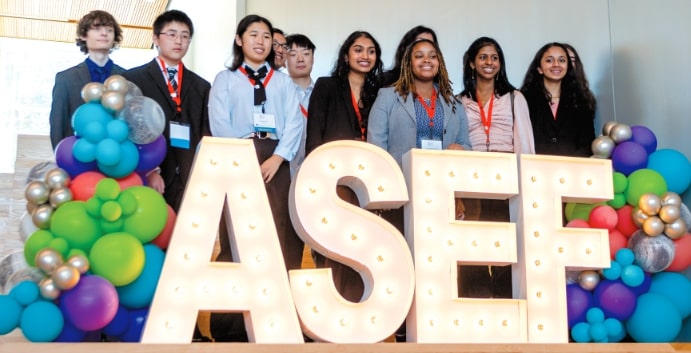
Auburn University welcomed nearly 200 of the brightest middle and high school minds to campus for the 2023 Alabama State Science and Engineering Fair (ASEF) this past April. Auburn University has become the new home of ASEF after 15 years as a regional site. Champions from four regional fairs representing 47 schools across Alabama assembled in Auburn’s Academic Classroom and Laboratory Complex (ACLC) to showcase science or engineering research projects, presenting their results to 150 judges from industry and academia.
The students competed for more than $15,000 in prizes spread over 178 awards. Senior division competitors also vied for a nomination to the world’s largest pre-college science competition, the Regeneron International Science and Engineering Fair (ISEF) in Dallas, Texas, in May 2023. ISEF gathers students from over 50 countries, regions and territories to showcase independent research of the top 1500 students in the world as they compete for nearly $4 million in prizes and scholarships.
Auburn University has more than 10,000 students majoring in STEM fields in each of its colleges, making up 40% of the student population. This is the highest number of STEM majors among all Alabama universities. The College of Sciences and Mathematics (COSAM) and the Samuel Ginn College of Engineering have been long-time science fair collaborators, but this year marked the first campus-wide alliance to support this statewide STEM initiative. Campus units contributed financially, provided judges and offered multiple awards to participants.
“We are proud to bring ASEF to the Plains and showcase the amazing resources, facilities and opportunities in STEM at Auburn,” stated Mary Lou Ewald, director of ASEF. “Hosting ASEF is an excellent opportunity for Auburn to recruit some of the best students in our state,” she added.
Following the student judging portion of the fair, ASEF showcased Auburn’s deep STEM roots through a hands-on science and engineering exhibition. Exhibitors included a large-animal birth simulator, a paper-making cart, science demonstrations, and an architecture workshop, all hosted by different Auburn colleges. ASEF competitors and their families also learned about campus resources and research initiatives and visited interactive exhibit tables.
Through support from Auburn academic units and an NSF statewide EPSCoR grant (FTTP, #214853), COSAM and the Samuel Ginn College of Engineering have created a new initiative called ASPIRE (Alabama Science Program for Inquiry- based Research Education) that brings Science and Engineering Fair opportunities to a diverse population in rural and urban schools in Alabama. Middle school teachers from low-socioeconomic and Title 1 schools participated in four days of professional development in the summer of 2023. The teachers receive additional support through Auburn mentors and project supplies.
“We can’t wait to host the most promising future scientists and engineers from Alabama to Auburn’s campus each year,” said Virginia Davis, ASEF director of faculty and community engagement. “Based on personal experience, I know how science fairs can open doors that you didn’t even know existed.”
ASEF 2024 is scheduled for April 6.
The Outreach and Engaged Scholarship Symposium, Advancing an Engaged AU, was held Thursday, September 7, 2023, at the Auburn University Hotel and Dixon Conference Center, showcasing outreach, extension, and engaged scholarship from faculty, staff, community professionals, students, collaborative teams and scholar groups from partnering institutions, public spaces and communities around the state.
The symposium featured a luncheon keynote by Jennifer Percell, Kennesaw State University professor, entitled “Radical Reciprocity: Operationalizing Sustainable Practices among Boundary Spanners to Advance Outreach and Engagement” and plenary sessions with presentations from more than 65 outreach and engaged scholars and professionals from colleges and units across the university as well as community organizations. The event also included a University Outreach Resource Fair, gallery walk and social, and the Auburn Across Alabama Experience reflection reception.
For over 200 attendees, this year’s symposium was an opportunity to have deliberate, intentional conversations about how engaged scholarship leads to significant, positive impacts in the community and the academy.
The objective of the symposium is to recognize current and ongoing public engagement, inform and offer best practice guidance for outreach and engagement, and promote engaged scholarship. The symposium is also a forum to promote, recognize, support and appreciate engaged and emerging scholars, including community partners, students, staff and faculty addressing critical needs in the state of Alabama and beyond.
A key element in this year’s symposium was the presentation of the inaugural Royrickers Cook Endowed Engagement Award. This year’s winner, Mary Lou Ewald, director of the College of Science and Mathematics, was honored for demonstrating an ongoing and purposeful commitment to outreach.
Ewald provides oversight and management of outreach programs, directs AU Science in Motion and the Southern Center of Robotics Education (SCORE), serves as one of the principal investigators of AU- AMSTI, and provides oversight of all grant-related activities for the unit. The award is named in honor of Dr. Cook, vice president for University Outreach and associate provost.
This year’s symposium was made possible by the support of numerous units and colleges across campus. Sponsors include the College of Sciences and Mathematics, Samuel Ginn College of Engineering, Harbert College of Business, Harrison College of Pharmacy, College of Liberal Arts, Graduate School, College of Architecture, Design and Construction, College of Veterinary Medicine, College of Nursing and Auburn University Libraries.
Distinguished Cook Award nominees: Champions of Community Engagement
The inaugural Royrickers Cook Engagement Award was presented to Mary Lou Ewald for her exceptional record of service through the College of Science and Mathematics. In addition to the winner of this award, there are several faculty members receiving honorable mention for their body of work and engagement.
Sean Forbes is a professor in the College of Education. Forbes established a community gardening partnership that leverages community and university resources to enhance food security and engages PK-12 students and teachers in Opelika City Schools while improving student outcomes. The program, which has been in place for more than 10 years, models an interdisciplinary approach that connects core academic standards to the universal relevance of food systems, food security, and food business with gardens, greenhouses, and a farmers market.
Ernest Gibson III is an associate professor in the College of Liberal Arts. Gibson was selected to author the commemorative poem for the dedication of the historic marker placed at renowned civil rights leader John Lewis’ childhood home in Troy. The poem, “This Land,” honors the history of both the land and the family that worked it. Gibson, an internationally recognized scholar on mid-20th century African American writers, combines art, academics, and activism in outreach work that includes moderating community conversations both within the state and nationally.
Surachat “Chat” Ngorsuraches is an associate professor in the Harrison College of Pharmacy. Ngorsuraches creates patient-centered communities that advance research for the care and treatment of multiple sclerosis and focuses on community engagement to improve access to effective, affordable, and preferred healthcare in the deep South. An outgrowth of the focus on advancing people-powered and people-driven research is an online seminar series, hosted through a national program, which connects researchers with patient partners. He also serves on a national committee that advances the needs and interests of a patient community through actionable and funded research.
Jaimie Roper is an associate professor in the School of Kinesiology. Roper applies expertise in human movement and motor control to develop community programs that address the health and mobility needs of older adults. The exercise program she developed during the 2020 COVID pandemic for people with Parkinson’s disease expanded beyond Alabama participants to a nationwide audience after it reached the attention of a national organization. Additional research and outreach include a focus on healthy aging, traumatic brain injury recovery, and introducing future bio-mechanists to the profession.
Kyle Schulze is an assistant professor in the Samuel Ginn College of Engineering. Schulze adopts projects for a mechanical engineer design class that provide solutions to accessibility and health needs. Class team projects have ranged from designing a device that regulates a child’s body temperature to building an adaptive bike in a brief period, which made it possible for an Auburn alum with amyotrophic lateral sclerosis (ALS) patient to continue participating in biking events.
Travis Smith is an assistant professor in the College of Education. Smith organized a national program to encourage students to extend their education beyond high school, connect high school and HBCU students to opportunities, and promote leadership, scholarship, and social awareness. Smith supports the work through a network of local school districts, community colleges, universities, nonprofits, and foundations. He has dedicated hours mentoring students in the LaFayette school system and worked to secure safe drinking water for the schools after a reservoir breach and a broken water main interrupted the water supply.
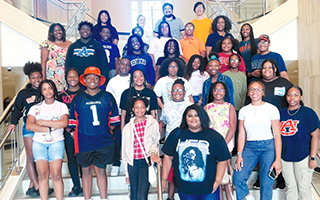
In June 2023, Young Professionals in Training (YPiT) hosted its second end-of-year celebration. YPiT hosts this annual event to allow families, mentors, community leaders, and Auburn faculty and staff involved in the program to come together to celebrate YPiT students’ accomplishments and reflect on the year. It also serves as a time to recognize and celebrate leaders in the community who have made an impact on YPiT and their respective communities.
YPiT student Destiny Padgett kicked off the ceremony with a special presentation of her musical talent as a self-taught guitar player. Her mother, Sherre Padgett, and brother, Wendell Padgett, accompanied her as the audience sang along to “Purple Rain,” a song made famous by the late artist Prince. Another YPiT student, Aidan Platt, performed a spoken word and shared his thoughts on what the program meant to him.
The ceremony also featured Whitney Lee, current Auburn Outreach programs administrator in Public Service, as keynote speaker. Lee gave a powerful, touching speech. Her topic, “Moments, Movements, and Monuments,” was very empowering and encouraging to YPiT students.
Attendees also reviewed each student’s Important Book submission. The Important Book, created by Martina McGhee, gives students the opportunity to reflect on things they learned throughout the year and apply these things in their personal lives. This year, students learned what it means to be civically engaged, gained social and emotional skills, and strengthened their professional skills. In the submissions, students presented a career of their choice related to the civic engagement theme. Students described the aspects of civic engagement related to their chosen career and listed the social and emotional skills needed to be successful in this role.
The mission of the Young Professionals in Training is to empower children and their parents to become change agents in their community.
During the ceremony, five recipients received awards. Jeremy Gray, Alabama state representative, and Messiah Williams Cole, Auburn University alum and mayor of Camp Hill, Alabama, received the YPiT Community Advocate Award for their civic leadership and support of YPiT. Tamarcus Milner, president of The Curtis House in Opelika, Alabama, received YPiT Collaborator of the Year Award for his commitment and continuous support of YPiT. Elizabeth Davore, current graduate student at Auburn University, received the YPiT Mentor of the Year Award in recognition of her outstanding dedication to YPiT in guiding, nurturing and empowering individuals to reach their fullest potential. Guy Trammel, Tuskegee historian, received the Ja’Lia Taylor Award of Excellence, as he embodies the profound dedication, leadership and commitment to excellence exemplified by YPiT founder, Ja’Lia Taylor. Lastly, Evan Carson received YPiT’s Innovator of Tomorrow Award for his scholastic achievement and acceptance into Auburn University as a YPiT Mentee. YPiT Founder, Ja’Lia Taylor, also presented Carson with a $500 scholarship, a new laptop for his college career, and a connection to a mentor in cyber security to support his aspirations to become a cyber security analyst.
A research team at Auburn University is using an innovative, community-driven approach to historic preservation to identify Rosenwald Schools in the state and work with communities to preserve them digitally and physically before they are lost. A collaborative effort between the College of Architecture, Design and Construction and the College of Liberal Arts, the team includes Junshan Liu, Richard Burt, and Hunter McGonagill (building science), Gorham Bird (architecture), David Smith (graphic design), Keith Hebert and Elijah Gaddis (history), and collaborator Danielle Willkens at the Georgia Institute of Technology.
The Rosenwald Schools initiative was started in the early 1900s during racial segregation to assist rural Black communities in the construction of new school buildings to improve the quality of education for children. Through the program, communities selected a building design that met their needs and combined philanthropic support from Julius Rosenwald, president of Sears, Roebuck, and Company, with community and state support to fund construction. By 1928, one-third of the South’s rural Black school children were in Rosenwald Schools. Following the integration of public schools, many of the Rosenwald Schools sat empty and fell into disrepair or were destroyed. It is not known exactly how many of the Rosenwald Schools remain standing in Alabama today.
The collaborative faculty team at Auburn is working to tell the story of the Rosenwald Schools in Alabama using a unique approach to preservation that combines history, community narratives, architectural preservation and technology. Community engagement is fundamental to their process. The first step with each of these schools is for the team to reach out to community members to engage them in the work. The public history faculty members have held oral history workshops for community members to learn how to collect stories from each other and community elders, including alumni of the Rosenwald Schools.
Along with the history harvest, the team works with the communities to digitally scan the schools using a combination of tools. The resulting images and information digitally preserve the buildings and allow safe, virtual access to deteriorated buildings. The goal of the work is to preserve the history of the Rosenwald Schools in Alabama and bring this moment in history to life to educate the public about the inequities in the education system, the work of the Julius Rosenwald Fund, and the impact of the schools on so many children and communities in Alabama.
As of the summer of 2023, scans have been completed at seven Rosenwald Schools around the state. Funding from the National Park Service has allowed the team to provide emergency stabilization of the Tankersley Rosenwald School, located in Hope Hull. After completing a historic structures report on the building, the next phase of work will begin, including rehabilitation of the roof and exterior of the building. The team took the building owners and other local community members to visit a Rosenwald School in Notasulga that has been rehabilitated and repurposed to get a sense of options and begin to envision the future life of the Tankersley School.
In fall of 2023, the Museum of Alabama at the Alabama Department of Archives and History in Montgomery will launch an exhibit of the work. The team hopes to partner with community members to preserve as many of these buildings as possible — both digitally and physically — before they disappear, then present the stories of these buildings to the public so everyone can engage with the legacy of the Rosenwald Schools.

Young Professionals in Training (YPiT) is a college pipeline program that exposes underserved students to college and professional careers. Students meet once a month to discuss different career areas, serve their communities, participate in social and emotional learning exercises and much more. For one Auburn University first-year student, the program made a definite difference.
Matthew Evan Carson, a native of Opelika, is attending Auburn University this fall after graduating from nearby Opelika High School. After learning about YPiT from his high school counselor, Carson attended one of the monthly sessions and became an active member. While participating in the program, Carson engaged in many activities and experiences, including touring the Tuskegee University campus and learning about the university’s rich history, participating in sessions emphasizing the need to prioritize mental health, learning about city governance, and gaining information on charities and civic engagement.
One area of focus, communications, was particularly valuable. “I’ve learned how to talk to people and how to speak in front of a large group of people, which is something I struggled with,” said Carson. “They created a safe environment where we could talk about how we were feeling mentally and discuss things going on in our lives.”
Carson says he would encourage other students to participate in YPiT.
“I would tell them to join because the benefits have been huge for me. Being in the program has helped me learn how to navigate college. We meet once a month, so there is not a time constraint. Plus Dr. Ewing and the staff run the program very well. I never felt like anything was unorganized.”
Participating in the program provided Carson with the advantage of becoming familiar with Auburn University, making important connections, and meeting friends he hopes to have throughout his time at Auburn. He is now majoring in computer science, a field he has been interested in since the sixth grade.
Although a very serious student, Carson is also looking forward to enjoying all aspects of student life, including attending the Iron Bowl for the first time. To learn more about the Young Professionals in Training (YPiT) program, visit auburn.edu/outreach/ceoe/youngprofessionals.htm
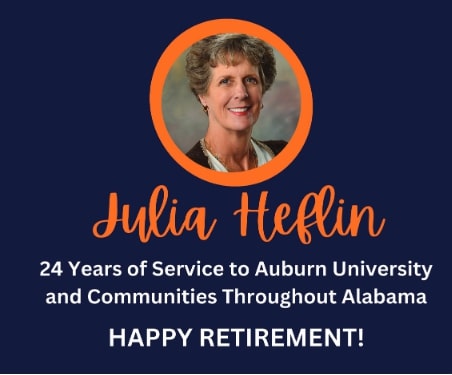
When Julia Heflin retired in November, she started enjoying her dream retirement home full-time, a home that, ironically, led her to work for Auburn University. Julia Berry graduated from Auburn with a degree in public relations in 1979 and, after working as a Delta flight attendant for a while, married her college sweetheart, Hugo Heflin. Soon after, she quit her job to move to Newnan, Georgia, and raise a son, Trey, and daughter, Rachael. In 1995, the Heflin’s moved to Alabama.
“Life is a clear testimony to God,” Heflin says. “One day you’re going one way, and then he turns you around in another direction.”
The Heflin’s settled in the Lake Martin area and dreamed of buying their retirement home on the lake, but to afford it, they both had to work, so Julia went back to work. After working a few years at Stillwaters Resort, she joined the Center for Governmental Services (CGS) staff as a training coordinator in 1999. While working full-time, she obtained her Master of Education in 2003.
Heflin continued to rise at CGS (which eventually became the Government and Economic Development Institute (GEDI), managing educational programs and expanding the course offerings. As Heflin reflects on her 24 years at Auburn University, she is filled with gratitude and hope for the future.
“I have learned so much from everyone who has impacted my life at Auburn, and I am excited about the direction GEDI is headed,” Heflin stated. “Under the direction of Jeremy Arthur and with a newly expanded training staff, GEDI is sure to create new programs to serve the needs of our elected officials and community leaders and expand upon our partnerships and past successes.”
Heflin, initially a training program manager, was promoted to manager of Outreach Programs in 2019. She managed training unit employees, over one hundred training, professional development, and certification programs, hosted numerous conferences and traveled the state to support GEDI’s government and municipal partners. She also served as executive director for the Alabama City/County Management Association (ACCMA).
“Throughout her tenure working at what is now GEDI, Julia has led efforts to train, educate and equip Alabamians with careers in the public sector with the tools, knowledge and expertise they need to serve the great state of Alabama. Her dedication can be felt and seen in every county in the state. She has tirelessly worked to ensure Auburn University provided the highest quality education product for those served by GEDI. She has left a mark for others to follow and set a standard that is second to none. As Julia begins a new chapter in retirement, we will miss her but know she will always be a part of our GEDI and Auburn University Outreach family,” said Jeremy Arthur, GEDI director.

GEDI director featured in Chamber Chat Podcast.GEDI’s director, Jeremy Arthur, was recently featured on an episode of the “Chamber Chat” podcast. Arthur, who served as president and chief executive officer of the Chamber of Commerce Association of Alabama for nine years prior to joining GEDI in 2021, shared his knowledge about chamber governance and working effectively with a board of directors. You can subscribe in your favorite podcast app or listen to the episode at chamberchatpodcast.com/episode228
Broadhead and Hill present at education conference
Amber Broadhead, a fourth-grade teacher at Edgewood Elementary School in Homewood, and Laura Hill, communications editor for the online Encyclopedia of Alabama (EOA), co-presented a session about using EOA in the classroom at the 2023 Alabama Education Technology Conference in Huntsville. Broadhead, who uses EOA for multiple activities with her students, was named the 2023 Alabama History Teacher of the Year by the Gilder Lehrman Institute of American History.
Street Names book awards second annual campership
Auburn teen Trinitee Pritchett is the recipient of the Carolyn Carlisle Campership, the second annual scholarship funded by the book “Auburn: A History in Street Names.” The high school junior, who wants to become a pediatric occupational therapist, rose to new heights this past summer as she attended aviation camp.
Authored by Sam Hendrix, “Auburn: A History in Street Names” gives a comprehensive history of the City of Auburn. Proceeds from book sales fund an endowment at Auburn University to provide academic camp scholarships for Auburn Youth Programs. The camperships, which cover costs of registration, on- campus lodging, and meals, provide the opportunity for local youth to attend week-long academic summer camps at Auburn University.
For more information on the book, or the Sam and Mary Ellen Hendrix Endowed Fund for Excellence in the Office of University Outreach, visit aub.ie/auburnstreetnames.
Auburn University NRT trainees create mural collage on local and global climate change impacts
The National Science Foundation Research Traineeship (NRT) Project Art Wall (mural) initiative is a unique and innovative way of science communication and interdisciplinary teamwork skills through a collaborative STEAM (STEM using Art) outreach project. Public art murals can be an effective medium of sharing knowledge with a community through visual storytelling, informative content and local cultural representation. The creation of the mural for public consumption and interaction enriches the graduate student’s science communication techniques beyond the traditional interdisciplinary research. The vision is that the NRT art mural will be painted on one of the walls on the Auburn University campus, which will be accessible to the public. The NRT trainees will have an immersive experience of learning interactively through art design process and science communication techniques, improving student involvement, creativity, metacognition and cognitive skills, which are the goals of the NRT program. The outcome of the NRT “Climate Change Impacts” mural paints the perfect picture of Auburn University’s mission as a land-grant institution to improve the lives of the people of Alabama, the nation and the world through forward-thinking education and scholarship.
New Approaches to the Study and Teaching of History
The Osher Lifelong Learning Institute (OLLI) at Auburn University joined forces with the College of Liberal Arts to help train the next generation of historians. Graduate students in history are required to take a course in pedagogy. Associate professors Eden McLean and Elijah Gaddis heard from students that they wanted more than just theory; they wanted practical application.
“Being involved in public history means you’re teaching.” said McLean. “Practicing teaching is also practicing a way of thinking about information and how to present it.”
In conjunction with OLLI Director Scott Bishop, the professors designed a new course to provide real- world experience teaching in a classroom. OLLI members would attend class while graduate students would have the opportunity to hone their presentation skills by sharing their areas of research. The class was filled with lively discussion as the student instructors asked probing questions about primary source analysis and how the meaning of source material is influenced by translation across language and time periods. OLLI’s enthusiastic and informed students provided insight on specific time periods and challenged the student instructor to consider alternate theories on some historical texts. The course took place at the Auburn Public Library and was also open to the public.
Auburn University, Sewon America establish training partnership
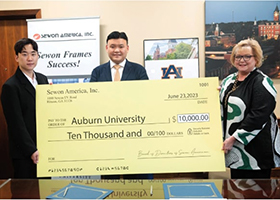
Officials with Auburn University and Sewon America, Inc., signed a memorandum of understanding (MOU) on June 23 to formalize a collaborative development of non-credit and for-credit training programs that lead to career opportunities. The ceremony concluded with a check presentation by Sewon leaders to initiate funding for program development. Auburn University Outreach will coordinate the details of the joint efforts that address company-specific needs, teach applied skills and lead to automotive manufacturing jobs.
The partnership furthers Auburn’s commitment to supporting the automotive industry and suppliers in the region through impactful collaboration. In December, Auburn University and Korea Institute of Industrial Technology (KITECH) initiated an MOU, expanding upon the collaborative research efforts of Auburn’s faculty and laboratories with local companies supported by KITECH.
YPiT Arts Immersion Experience
From June 12, 2023, to June 16, 2023, Young Professionals in Training (YPiT) collaborated with the Caroline Marshall Draughon Center for Arts and Humanities, the Jule Collins Smith Museum of Fine Arts, the Jay and Susie Gogue Performing Arts Center, and the Auburn University Department of Theatre and Dance to create the “Arts Immersion Experience,” an arts day camp giving students the opportunity to “Explore the Arts and the Careers that Surround Them.”
Participants in the camp experienced many aspects of the arts and witnessed the behind-the-scenes work that goes into the production and display of art. At the beginning of the week, participants focused on what art is in general and what art means to them. Students expressed this through drawing, poetry and conversation. Some students stated that art symbolized freedom, expression, non-judgment, coping, and so much more. One student stated, “Art is my life.”
As the week progressed, students explored the ins and outs of the Jay and Susie Gogue Performing Arts Center and the Jule Collins Smith Museum of Fine Arts. The staff at the Gogue Center gave an in-depth tour of the Performing Arts Center, showcasing the equipment and tools necessary in production, such as lighting, sound and rigging, and what those tools bring to a production. Students also saw what it is like to be on the stage and create a story.
The Jule Collins Museum led the participants through the museum and discussed things to look for in art. They learned about what makes art valuable and how art pieces are transported, prepared and displayed to the public.
Wrapping up the week, students discussed art career opportunities with a panel of professionals in the arts. Students also heard from the professionals about their journey into the arts. They discussed what led them into their respective careers and gave students insight and advice on things to consider about the arts. The program exposed participants to fine arts and the careers that surround them, leaving a lasting impact. Special thanks to the partners that made this experience successful: Jule Collins Smith Museum of Fine Art, Jay and Susie Gogue Performing Arts Center, Auburn University Department of Theatre and Dance, and the Caroline Marshall Draughon Center for Arts and Humanities. YPiT is a program of Auburn Outreach’s Center for Educational Outreach and Engagement (CEOE), under the leadership of Venus Hewing, outreach programs manager, and Anna- Margaret Goldman, CEOE director.

Office of Faculty Engagement welcomes new administrator
 Amy Wadsworth Register is thrilled to be at Auburn
University as the administrator in
the Office of Faculty Engagement
and Encyclopedia of Alabama. A 1999
graduate of Auburn University, Amy
is a tenured business professional
with close to 25 years of experience
in marketing, program development,
business consulting and non-profit
work. Most recently Register has
used her experience to consult
with small businesses and non-profit organizations
to improve their marketing strategy and corporate
culture. In 2017, she used her expertise to start a
501(c)(3) non-profit serving families who receive a
congenital diaphragmatic hernia diagnosis. During
her five years serving as the executive director of
the CDH Foundation, Amy led all marketing, program
development and process development efforts.
Amy resides in Auburn with her husband, two sons
and three dogs. She enjoys cooking, decorating and
antiquing in her free time.
Amy Wadsworth Register is thrilled to be at Auburn
University as the administrator in
the Office of Faculty Engagement
and Encyclopedia of Alabama. A 1999
graduate of Auburn University, Amy
is a tenured business professional
with close to 25 years of experience
in marketing, program development,
business consulting and non-profit
work. Most recently Register has
used her experience to consult
with small businesses and non-profit organizations
to improve their marketing strategy and corporate
culture. In 2017, she used her expertise to start a
501(c)(3) non-profit serving families who receive a
congenital diaphragmatic hernia diagnosis. During
her five years serving as the executive director of
the CDH Foundation, Amy led all marketing, program
development and process development efforts.
Amy resides in Auburn with her husband, two sons
and three dogs. She enjoys cooking, decorating and
antiquing in her free time.
OPCE welcomes new staff

Phil Chansler earned his doctorate in business administration at Auburn University Harbert College of Business. He also holds master’s degrees in human resources from Auburn University, engineering systems management from the University of Southern California, aeronautical engineering from the Air Force Institute of Technology and an MBA from Auburn University at Montgomery. His bachelor’s degree is in mechanical engineering from the University of Colorado, and he is certified by both the US Air Force and the US Navy as a Lean/Six Sigma Blackbelt practitioner. He has a broad background in major systems procurement in the space launch and airlift aircraft industries at multiple levels from space launch operations to congressional liaison work. Additionally, Chansler served over 25 years at the SACS-accredited Air University as assistant professor of operations management as well as in various staff and leadership positions. In his role with the Office of Professional and Continuing Education, he oversees conference and event services, leadership programs and custom training.
 Jenny Lee joined the Office of
Professional and Continuing
Education in fall 2023 as coordinator
for Korea Corner. She earned her
bachelor’s degree in Christian
education from Biola University in
California. Lee is a certified Korean
language teacher with four years of
teaching experience and two years as
a director at a Korean school. Additionally, she served
as a director for youth ministry and child ministry for
seven years. Lee brings over a decade of combined
experience in program development and management
within the education field to her role.
Jenny Lee joined the Office of
Professional and Continuing
Education in fall 2023 as coordinator
for Korea Corner. She earned her
bachelor’s degree in Christian
education from Biola University in
California. Lee is a certified Korean
language teacher with four years of
teaching experience and two years as
a director at a Korean school. Additionally, she served
as a director for youth ministry and child ministry for
seven years. Lee brings over a decade of combined
experience in program development and management
within the education field to her role.
 Logan McKissick joined the Office
of Professional and Continuing
Education in April of 2023. She
serves as a program developer for
Auburn Youth Programs under the
direction of Jim Franklin. In this role,
she handles the coordination for
many youth programs and summer
camps bringing thousands of middle
and high school students to Auburn. McKissick’s
responsibilities include overseeing Varsity Spirit
cheer and dance camps, wheelchair basketball camps,
and the High School Leadership Conference, to name
a few. McKissick earned her Bachelor of Science in
social science education from Troy University. She
has experience in education and conference planning,
most recently serving the YMCA of the Rockies as
the environmental education assistant director
coordinating programs in Rocky Mountain National
Park.
Logan McKissick joined the Office
of Professional and Continuing
Education in April of 2023. She
serves as a program developer for
Auburn Youth Programs under the
direction of Jim Franklin. In this role,
she handles the coordination for
many youth programs and summer
camps bringing thousands of middle
and high school students to Auburn. McKissick’s
responsibilities include overseeing Varsity Spirit
cheer and dance camps, wheelchair basketball camps,
and the High School Leadership Conference, to name
a few. McKissick earned her Bachelor of Science in
social science education from Troy University. She
has experience in education and conference planning,
most recently serving the YMCA of the Rockies as
the environmental education assistant director
coordinating programs in Rocky Mountain National
Park.
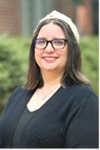 Kristina Hickman earned associate
degrees in applied science-child
development and science from
Southern Union State Community
College. Prior to joining the Office
of Professional and Continuing
Education in May 2023, she served as
the office manager of a local church.
Kristina and her husband, Sam, have
four children.
Kristina Hickman earned associate
degrees in applied science-child
development and science from
Southern Union State Community
College. Prior to joining the Office
of Professional and Continuing
Education in May 2023, she served as
the office manager of a local church.
Kristina and her husband, Sam, have
four children.
Staff Updates
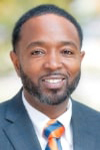
The Outreach Information Technology and CEU Office welcomes Rodrigus Cannon as a new full- time systems engineer. Mr. Cannon earned his bachelor’s degree in business administration from Troy University, and a master’s degree in information systems from the University of Alabama at Birmingham. Prior to arriving at Auburn, Rodrigus spent time as an IT project manager at Tuskegee University, and a technical project manager UAB hospital. Welcome to Outreach!
 Congratulations to Austin Ryan
on earning his bachelor’s in
communications from Auburn
University! Austin joined the
Outreach family as a freshman
in the Outreach Information
Technology and CEU Office. His
contributions over the years has
encompassed general IT support
along with web site updates, development and social
media content.
Congratulations to Austin Ryan
on earning his bachelor’s in
communications from Auburn
University! Austin joined the
Outreach family as a freshman
in the Outreach Information
Technology and CEU Office. His
contributions over the years has
encompassed general IT support
along with web site updates, development and social
media content.
 Welcome the newest member
of the OLLI at Auburn staff,
Kathryn Jones. Kathryn serves
as the registrar and office manager.
Her responsibilities include class
registrations, collecting membership
dues and answering general
questions about OLLI. She can be
reached at kcj0022@auburn.edu
or 334-844-3146.
Welcome the newest member
of the OLLI at Auburn staff,
Kathryn Jones. Kathryn serves
as the registrar and office manager.
Her responsibilities include class
registrations, collecting membership
dues and answering general
questions about OLLI. She can be
reached at kcj0022@auburn.edu
or 334-844-3146.
 Linda Gibson-Young, professor and outreach coordinator, Auburn University College of Nursing; Morehouse College John Lewis
Scholar Interns; Heidi LeSane, MPA. Life Scientist Asthma Program Manager at US Environmental Protection Agency (EPA); Rachel
Snoddy, County Extension Coordinator, Chambers County; Ellen Buckner, Professor Moffett and Sanders School of Nursing.
Linda Gibson-Young, professor and outreach coordinator, Auburn University College of Nursing; Morehouse College John Lewis
Scholar Interns; Heidi LeSane, MPA. Life Scientist Asthma Program Manager at US Environmental Protection Agency (EPA); Rachel
Snoddy, County Extension Coordinator, Chambers County; Ellen Buckner, Professor Moffett and Sanders School of Nursing.
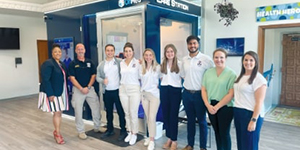 Chippewa Thomas, professor and director of Faculty Engagement,
Office of the Vice President for University Outreach; Jim
Doody, EMS fire chief Chambers County, Edward Via College
of Osteopathic Medicine (VCOM) P2 Students on Preventative
Health; Leah Sledge, administration, Chambers County
Community Health and Wellness; Rachel Snoddy, county
extension coordinator, Chambers County.
Chippewa Thomas, professor and director of Faculty Engagement,
Office of the Vice President for University Outreach; Jim
Doody, EMS fire chief Chambers County, Edward Via College
of Osteopathic Medicine (VCOM) P2 Students on Preventative
Health; Leah Sledge, administration, Chambers County
Community Health and Wellness; Rachel Snoddy, county
extension coordinator, Chambers County.
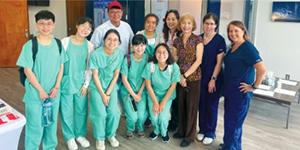 Visiting Scholars Taiwan, National Cheng Kung University,
National Taipei University of Nursing and Health Sciences
and National Taipei University of Technology; Pao Feng
Tsai, associate dean for research, Auburn University College
of Nursing; Christine Feeley, assistant professor, College
of Nursing, Linda Gibson-Young, professor and outreach
coordinator, College of Nursing.
Visiting Scholars Taiwan, National Cheng Kung University,
National Taipei University of Nursing and Health Sciences
and National Taipei University of Technology; Pao Feng
Tsai, associate dean for research, Auburn University College
of Nursing; Christine Feeley, assistant professor, College
of Nursing, Linda Gibson-Young, professor and outreach
coordinator, College of Nursing.
 Royrickers Cook, vice president for University Outreach and associate provost at Auburn University, visits with the Auburn Unit of
the Boys and Girls Clubs of Greater Lee County who serves residents of Auburn and the surrounding area.
Royrickers Cook, vice president for University Outreach and associate provost at Auburn University, visits with the Auburn Unit of
the Boys and Girls Clubs of Greater Lee County who serves residents of Auburn and the surrounding area.
Send your Outreach news, opportunities, projects and programs to outnews@auburn.edu or send us your email address to join the monthly newsletter mailing list!
The Outreach newsletter serves to provide our Auburn Family with ongoing updates regarding the tremendous outreach initiatives that are collaboratively launched between our unit and others across campus to impact citizens across Alabama and beyond. We are pleased to add this to our publication portfolio and hope this will inspire you to join us in making a difference!
 Two of the founding directors of the division of University Outreach passed away this summer,
William H. Compton and Maury S. Matthews. Both
played pivotal roles in the formation of the new
outreach organization in 1988 under Vice President
Ann Thompson and Associate VP Bill Sauser’s
administration.
Two of the founding directors of the division of University Outreach passed away this summer,
William H. Compton and Maury S. Matthews. Both
played pivotal roles in the formation of the new
outreach organization in 1988 under Vice President
Ann Thompson and Associate VP Bill Sauser’s
administration.
William Compton, better known to his campus colleagues as “Bill” or “Captain,” passed away May 13 at age 88 in Notasulga. Born in Shreveport, Louisiana, Compton had a distinguished 32-year career in the U.S. Navy as a pilot and administrator, culminating in his appointment as commander of Auburn University’s Naval ROTC unit. Upon his retirement from military service in 1988, Captain immediately transitioned into the role of opening and directing Auburn’s new conference center as part of University Outreach. Under his leadership, the conference center became a premier educational outreach facility for regional and national conferences, continuing education programs, civic meetings and community events.
Using his wealth of administrative experience, Compton contributed significantly to the strategic planning process for University Outreach. He worked effectively with his fellow Outreach directors, faculty and community leaders to expand Auburn’s capacity to engage the community, resulting in steady increases in utilization of the conference facility. Captain served as director of the conference center for 12 years before his retirement from Auburn. Well known for his unceasing devotion to his family, friends and community, he was active in the Auburn Rotary Club and Holy Trinity Episcopal Church. He was a fan’s fan of all Auburn sports, especially Tiger football. Compton is survived by his loving and devoted wife of 65 years, May, and their children, grandchildren and great-grandchildren.
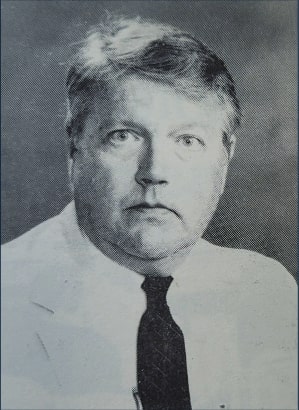
Maury Matthews passed away on July 6 in Auburn at the age of 85. Born in Danville, Virginia, Matthews received his Ed.D. in higher education from the University of Virginia. He joined the faculty of Auburn University in 1977, serving as dean of continuing education and later as director of University Continuing Education (UCE). Matthews built upon the base of community learning programs to establish a wide array of professional continuing education, independent study, and personal enrichment programs, including summer academic and athletic programs for youth. Well-respected in higher education continuing education circles, he was active in regional and national professional organizations such as the Association for Continuing Higher Education. Joining the new University Outreach division in 1988, Dr. Matthews continued to expand UCE to include the university’s first distance learning office and developed the first policies and reporting procedures for campus-wide continuing education programs, which are still in use today.
In 1993, he joined the central division office as assistant to the vice president, where he organized the first university-wide outreach council, engaging faculty and unit directors from every college on campus. He chaired the 1995 “Partnership with the People” statewide public forum series, which engaged citizens in setting priorities for outreach programming at Auburn. In 1995 and 1996, Matthews facilitated two influential faculty ad-hoc committees in developing an official definition of scholarly outreach work as well as criteria for evaluating faculty outreach, still used in the faculty handbook tenure and promotion guidelines today. In 1996, he helped organize one of the nation’s first symposia on faculty outreach scholarship. Maury, along with his beloved wife, Mary Lou, engaged in many community and campus activities after his retirement. He was an accomplished photographer and master gardener, as well as a devoted Auburn sports fan, helping establish the Auburn Diamond Club that supports Auburn baseball. Preceded in death by Mary Lou, Matthews is survived by his children, grandchildren and many extended relatives.
“I had the honor of working with Bill and Maury in University Outreach,” said Assistant Vice President Emeritus Ralph Foster. “Both were significant mentors to me in my career at Auburn and, after, were cherished friends. Their impact on the mission, programming and capacity of University Outreach and the scholarship of engagement is still felt today.”
Last Updated: February 26, 2024

